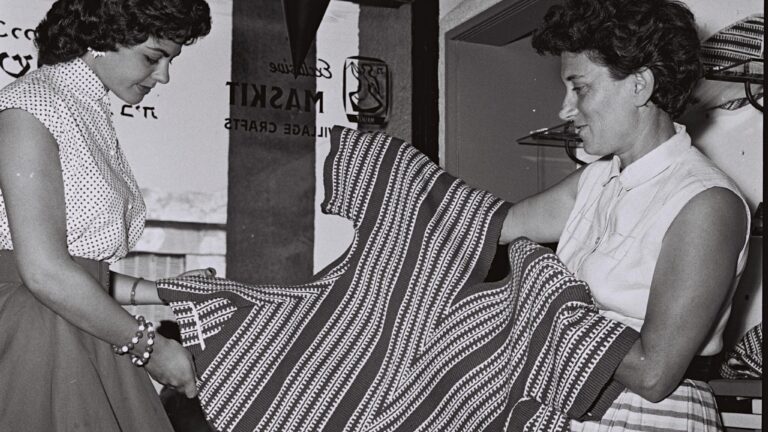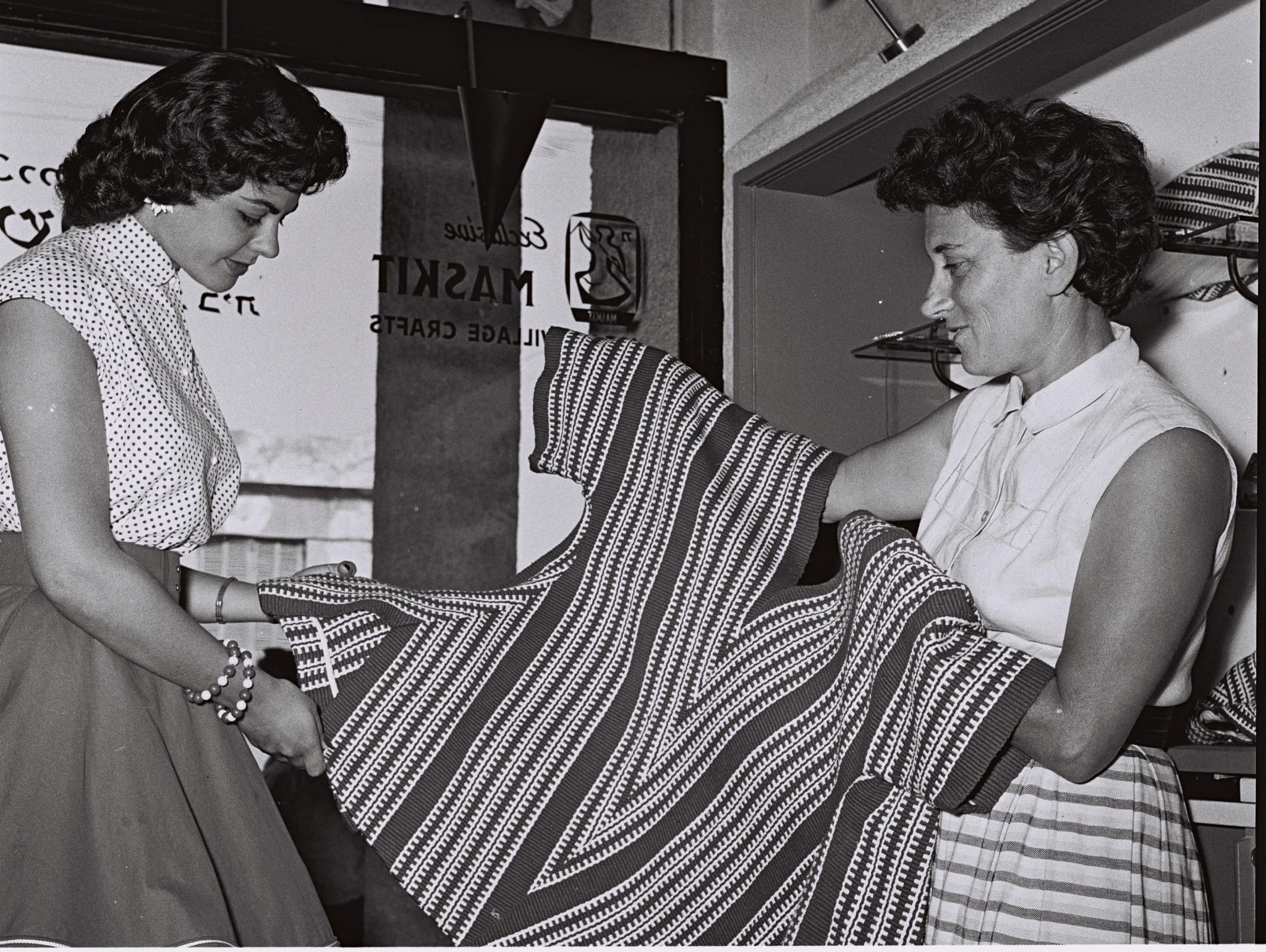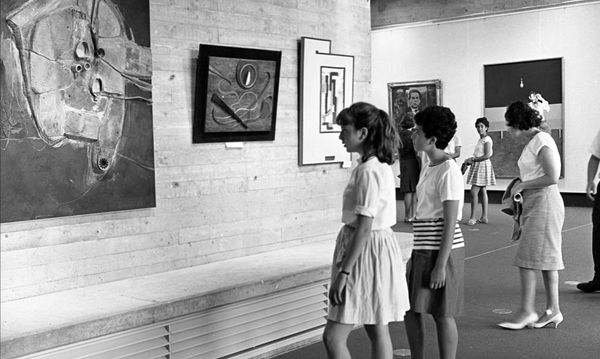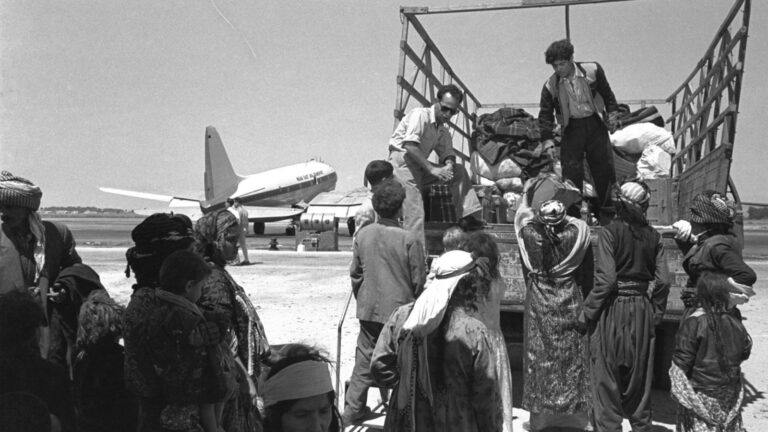
Israel is founded on May 14
1948
• Israel is founded on May 14, 1948, a few hours before the British Mandate is due to expire. Eleven minutes later, the United States becomes the first country to recognize the Jewish state when it grants Israel de facto recognition. On May 15, Egypt, Iraq, Jordan and Syria invade Israel. The War of Independence lasts 13 months.
• The Supreme Court of Israel is inaugurated, the Israeli lira replaces the Palestinian pound, the Israeli flag becomes the state’s official flag.
• El Al, Israel’s new national airline, operates its maiden flight, bringing Israel’s first president, Prof. Haim Weizmann, home from a diplomatic visit to Geneva.
• The new country’s population numbers 806,000.
Nobel prize winner Dan Shechtman recalls Israel's declaration of Independence
1948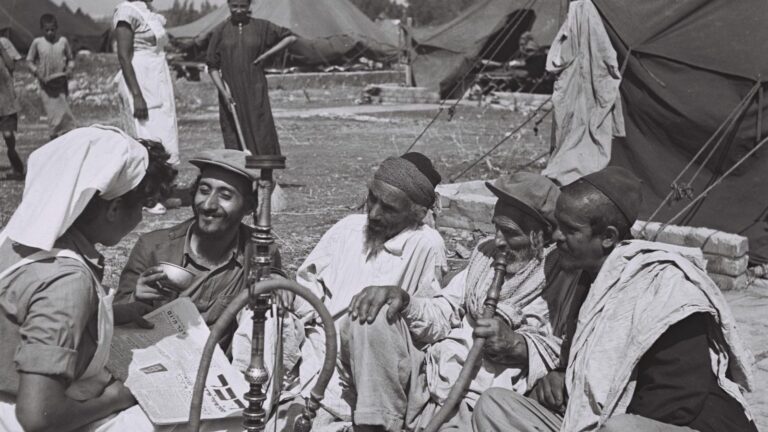
Operation Magic Carpet begins
1949Some 49,000 endangered Yemenite Jews, and some from countries including Saudi Arabia, are airlifted to Israel in a secret operation involving 380 flights by British and American transport planes taking off from Aden.
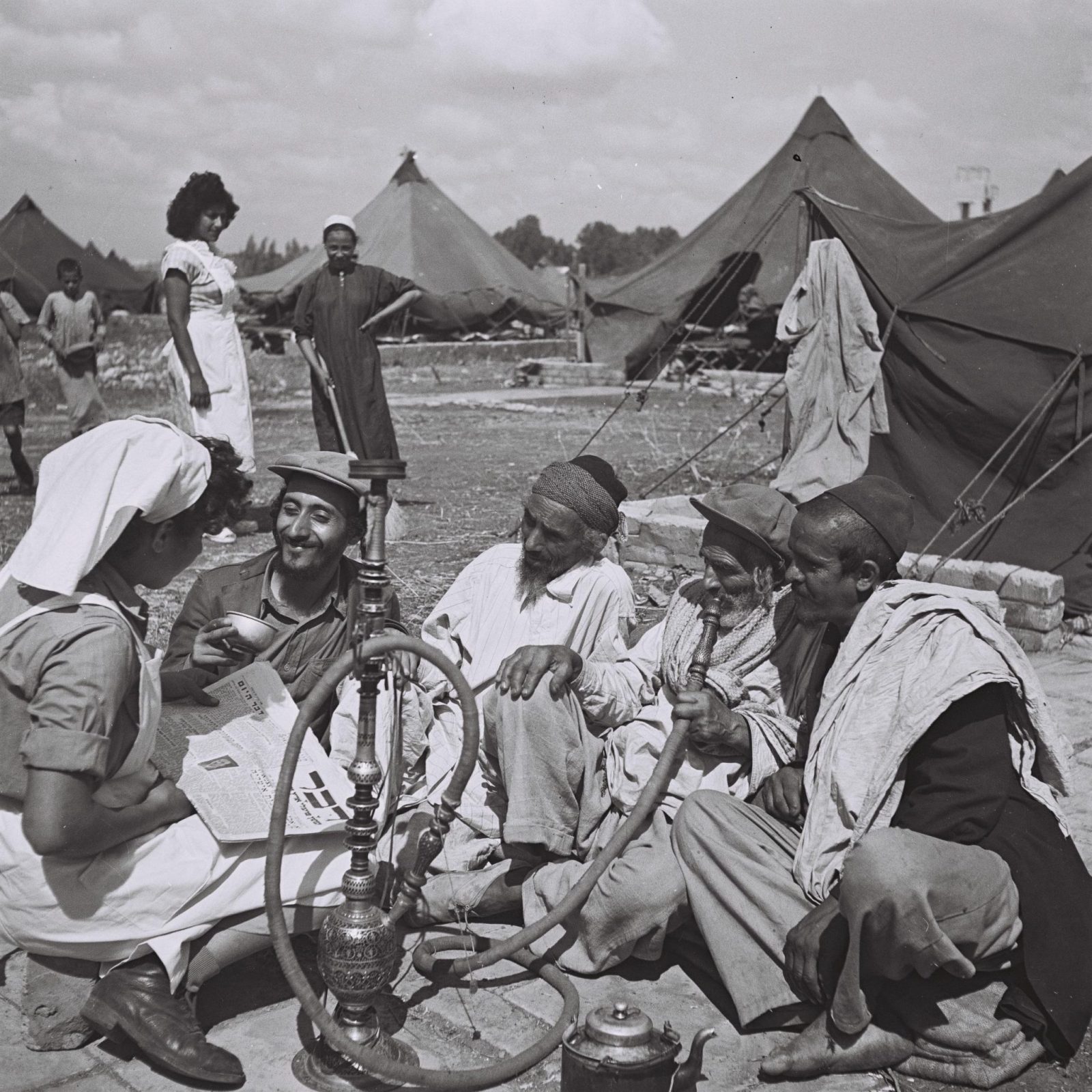
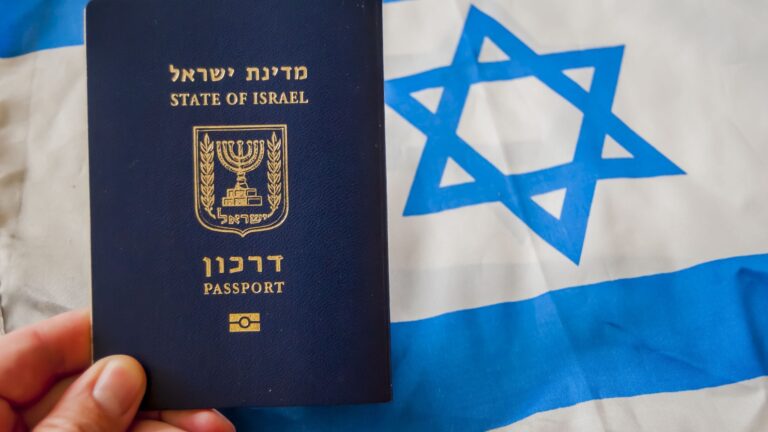
The Law of Return is formally enacted
1950Israel’s Law of Return, approved by the Knesset on July 5, entitles anyone of Jewish matrilineal descent, or a Jewish convert, to immigrate to Israel and obtain full citizenship.
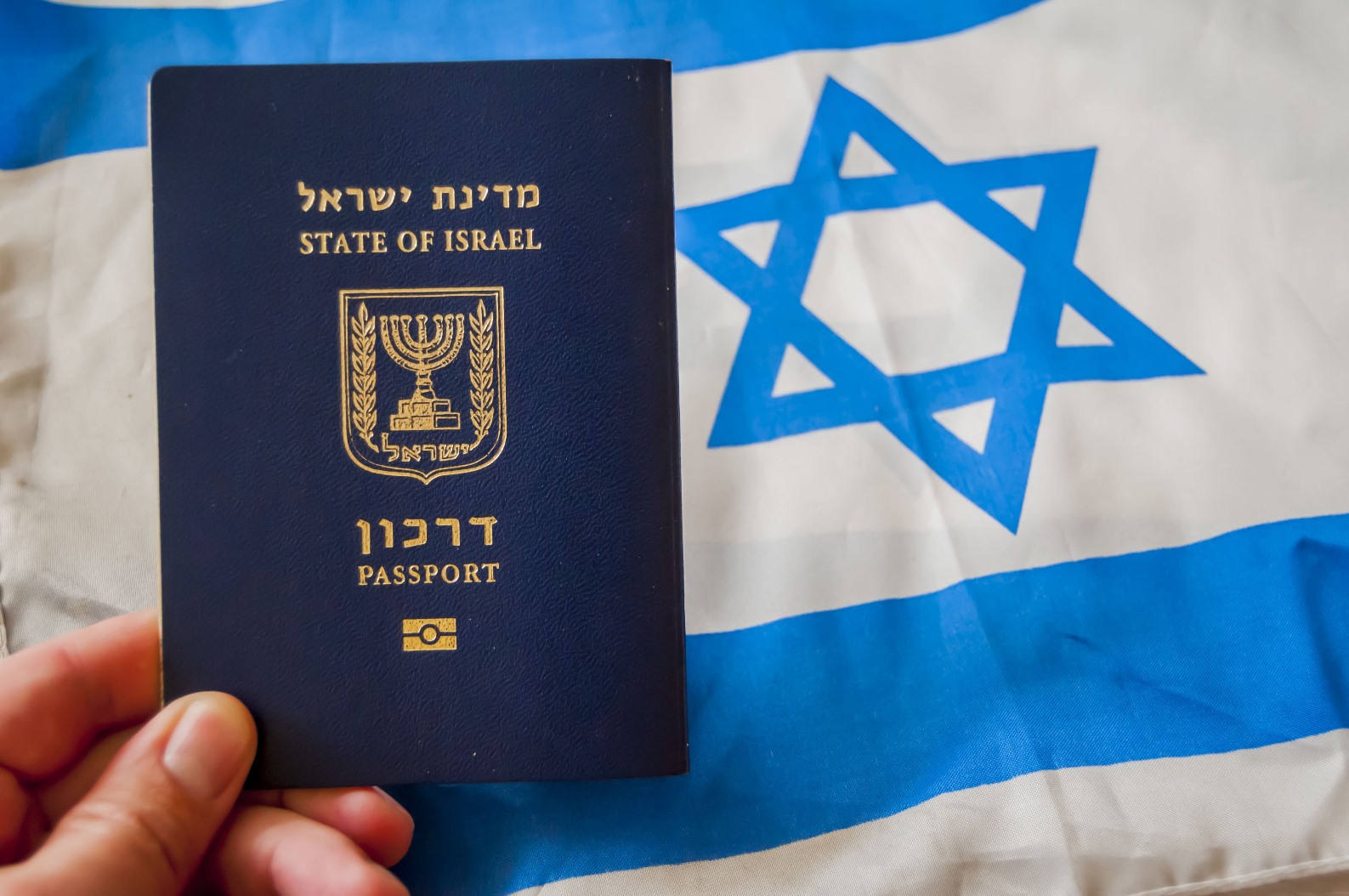
The law was later amended to state that the same rights are also vested in a child and a grandchild of a Jew, the spouse of a Jew, the spouse of a child of a Jew and the spouse of a grandchild of a Jew, except for a person who had been Jewish and voluntarily changed his or her religion.
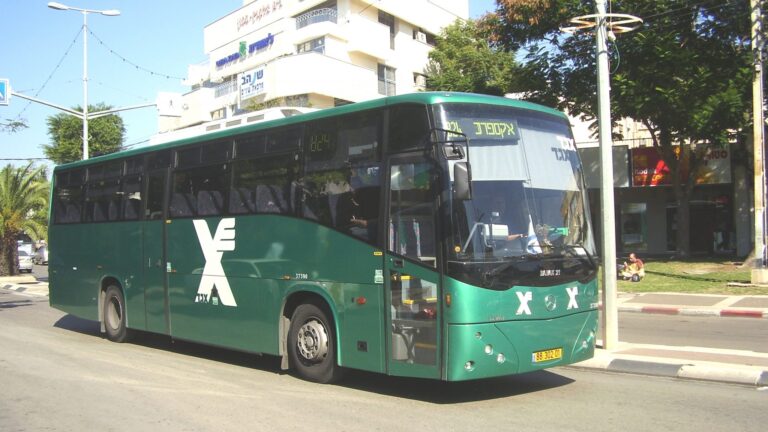
Israel gets a national bus company
1951-
- The Tel Aviv Stock Exchange opens for business. Today, about 544 companies are listed on the exchange.
- The Egged bus company becomes a cross-country public transportation network after merging with the northern Shahar bus company and the southern Drom Yehuda bus company. Today, Egged buses make more than 25,000 trips every day, providing about half of Israel’s public transport services via a fleet of 3,057 buses.
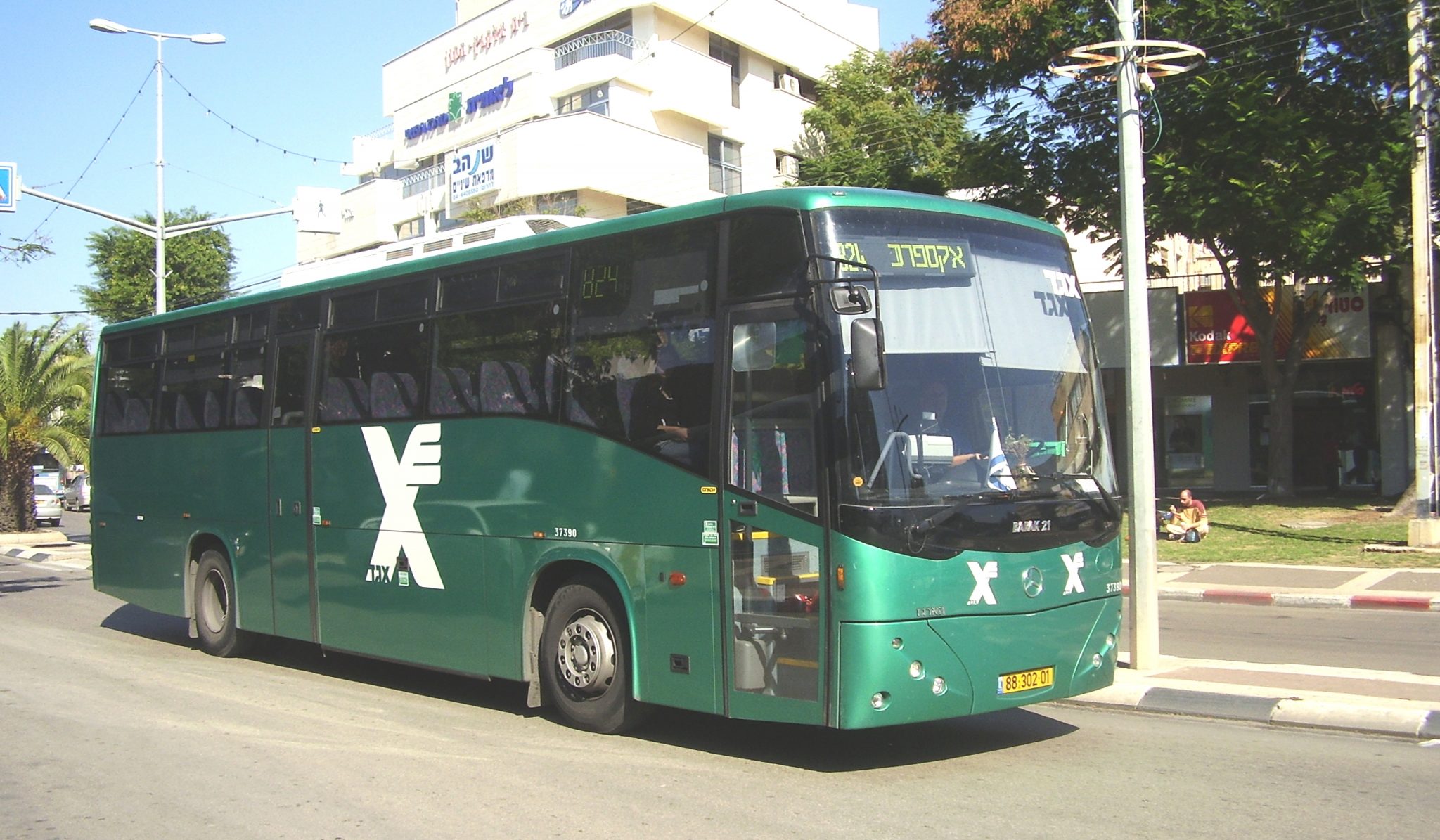 An Egged bus in Afula. Photo courtesy Wikipedia
An Egged bus in Afula. Photo courtesy Wikipedia
Stef Wertheimer sets up ISCAR
1952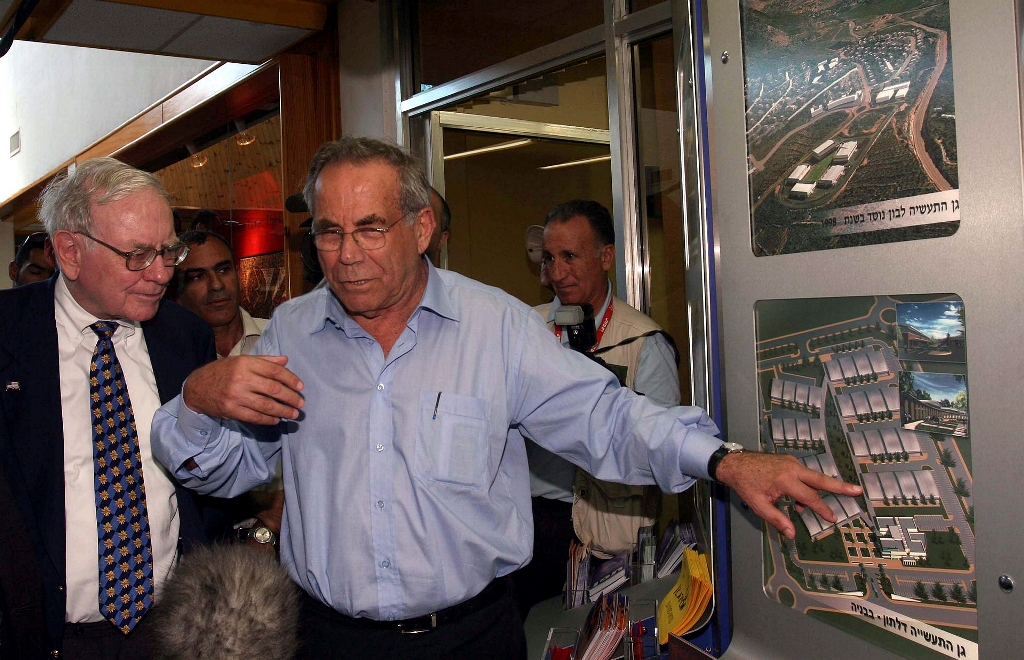
High-school dropout Stef Wertheimer sets up a small metal shop and tool-making company in the backyard of his home in Nahariya. His company, ISCAR, quickly becomes a success. In 2006, Berkshire Hathaway, a holding company for billionaire investor Warren Buffett, buys 80% of the company for $4 billion, and a few years later buys out the rest for $2.05 billion. Today, ISCAR is one of the world’s largest manufacturers of carbide industrial cutting tools used by carmakers like Ford and General Motors, employing 6,000 people in branches in 50 countries.
Over the years, Wertheimer, one of Israel’s biggest industrialists, founds six industrial parks in Israel and another in Turkey, to help create jobs and stability in the region. The first, Tefen Industrial Park, was built in 1982. Another, based in Nazareth, opened in 2013 and provides employment to Jews and Arabs.
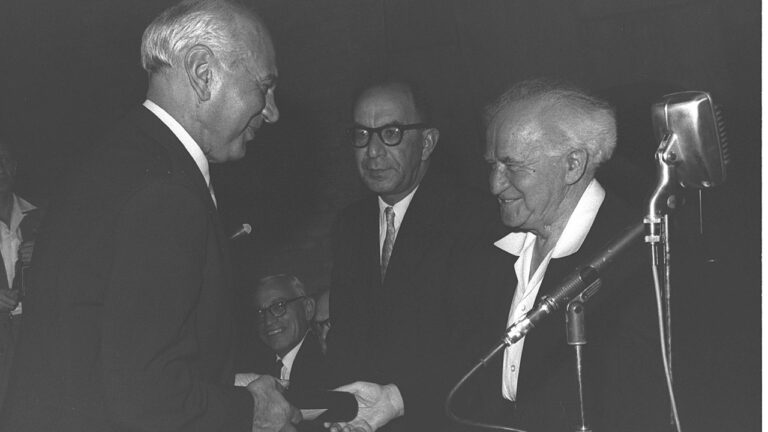
Conquering the desert
1953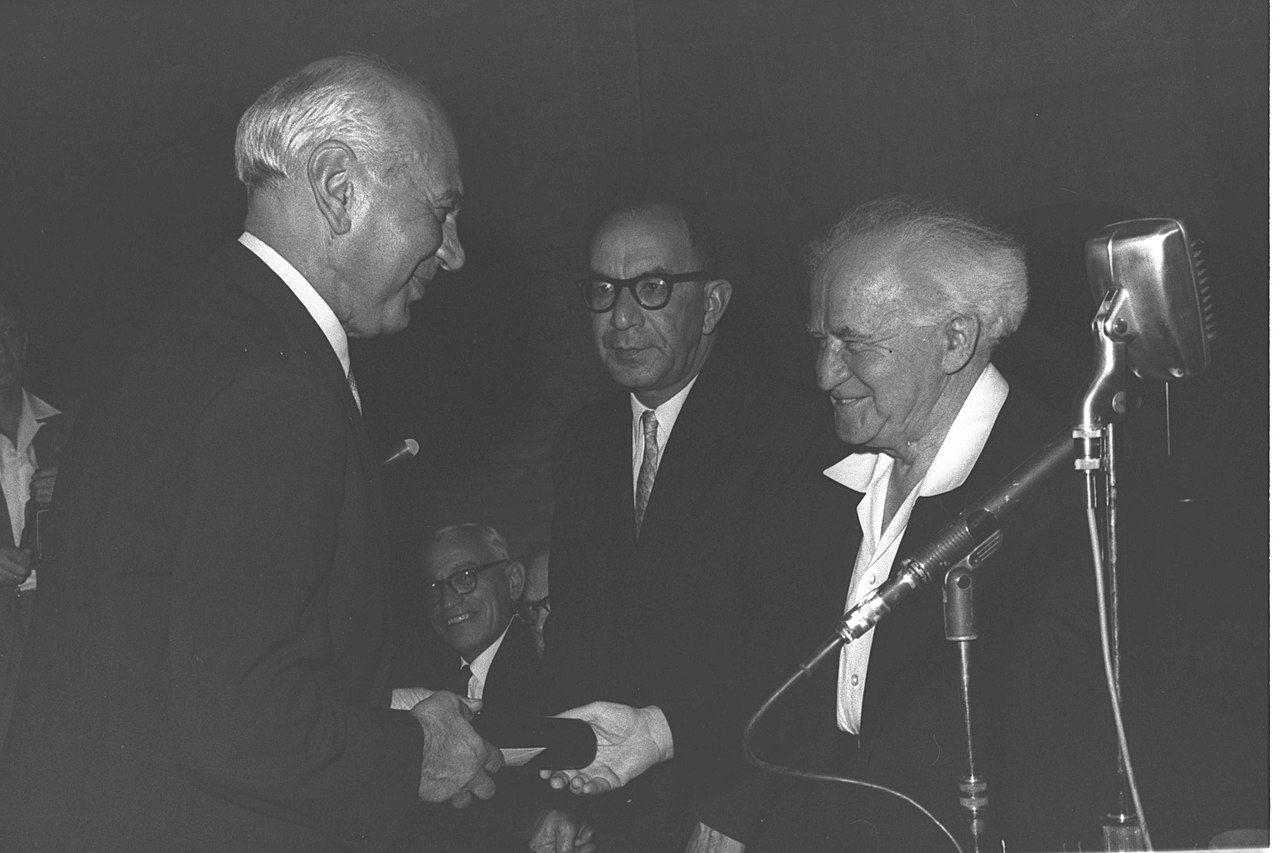
• The Israel Prize, the state’s highest cultural honor, is awarded for the first time. The nine recipients represent the fields of Jewish studies, literature, education, social science, medical science, fine arts, exact sciences and life sciences.
• The Conquest of the Desert world’s fair opens in Jerusalem, focusing on the themes of reclamation and population of desert area. Some 600,000 people visit the fair.
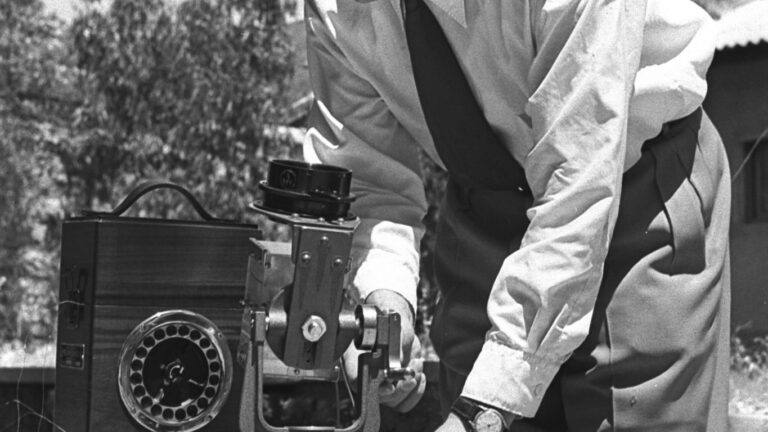
The solar water heater is born
1955Israeli physicist Dr. Harry Zvi Tabor develops a new type of solar heater (dud shemesh in Hebrew), to produce hot water for households.
Six years later, Tabor and Lucien (Yehuda) and Yehudit Bronicki created a solar-powered turbine that uses an alternative liquid to move an electric generator even when the sun’s rays aren’t strong. They applied this innovation to geothermal energy with great success through their global company, Ormat.
Tabor, known as the father of Israeli solar energy, is credited with bringing Israel’s solar energy program to international prominence.
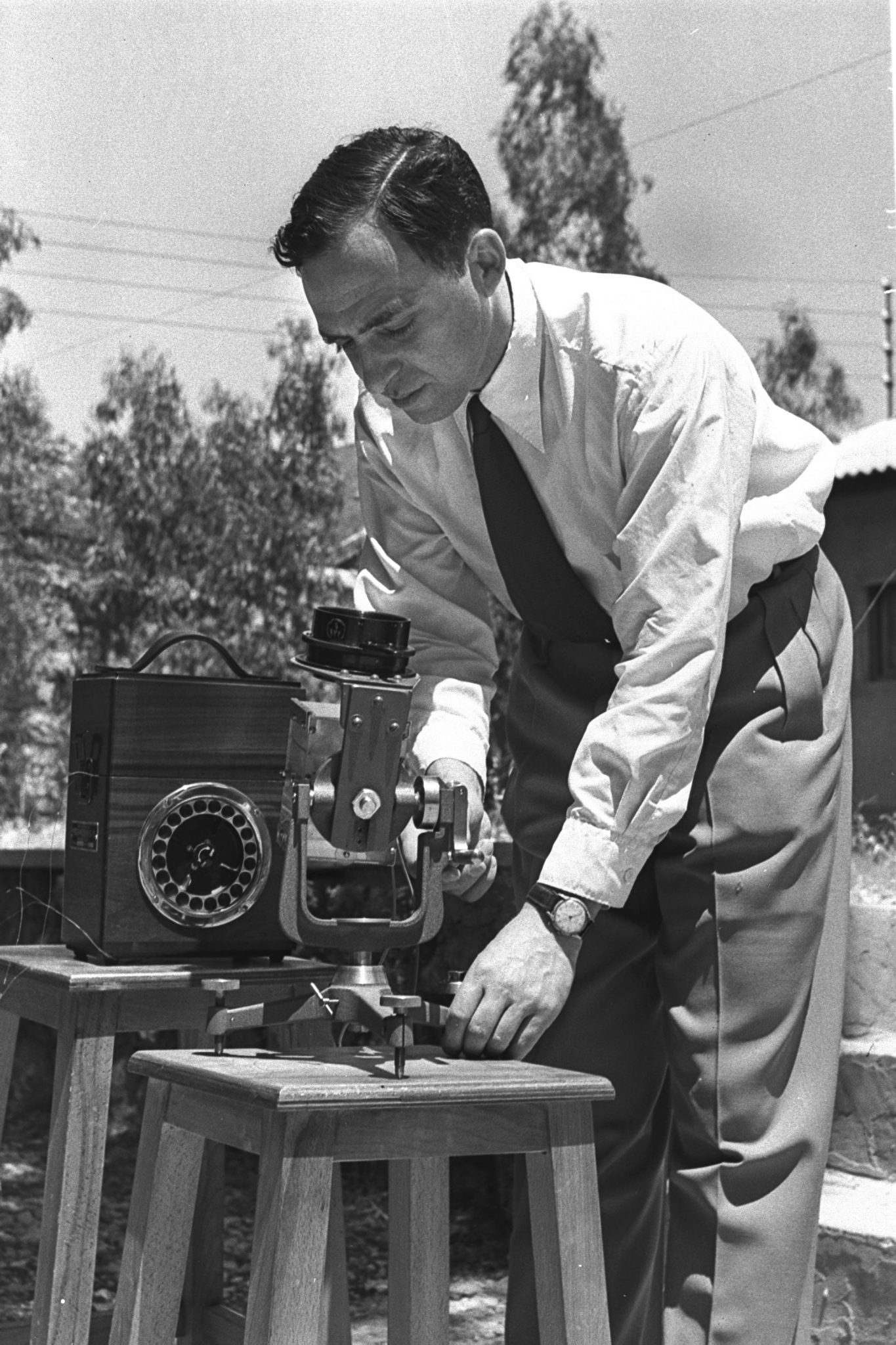
Inventor Dov Moran takes a look back at his childhood years in Israel
1955The Israel Dairy Board is founded
1956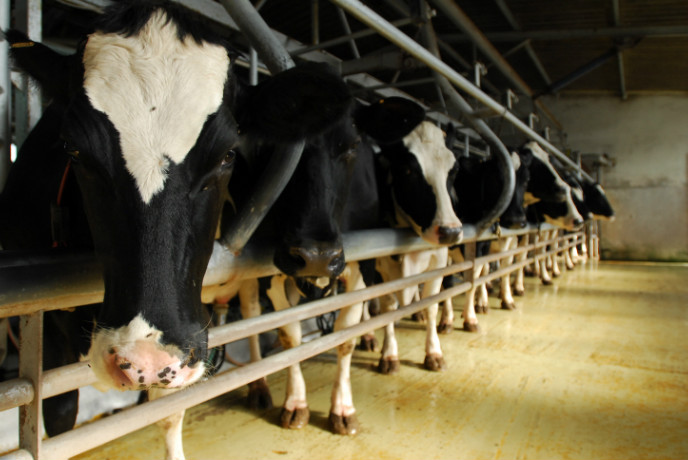
• The Israel Dairy Board is founded, helping to cement Israel’s growing lead in the dairy industry. Today, Israel’s dairy industry produces the highest milk yield per cow worldwide, and acts a model of achievement for dairy farmers everywhere.
• Tel Aviv University opens.
Israel pledges to help the developing world
1957
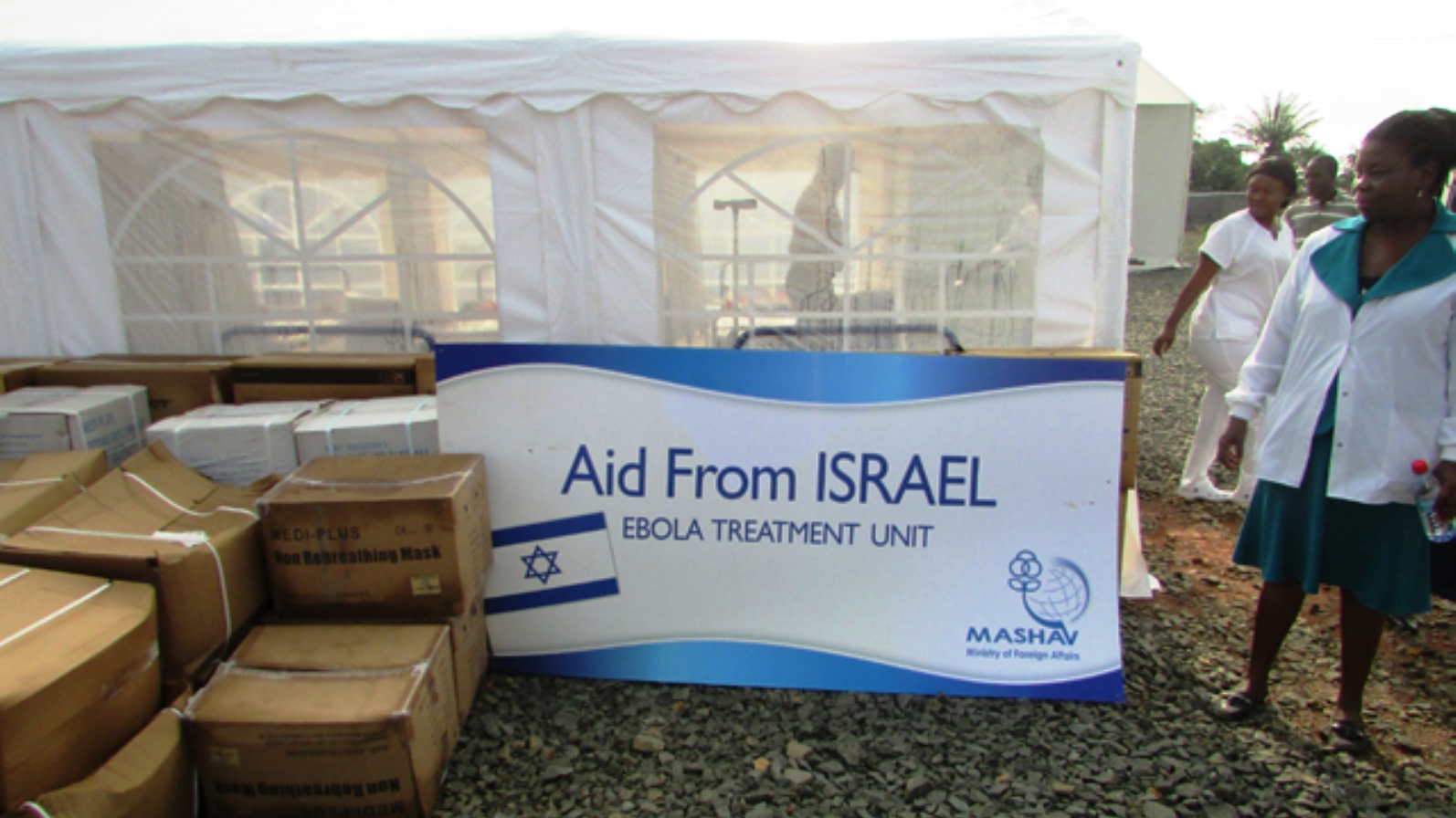
- MASHAV, Israel’s Agency for International Development Cooperation, is founded by Golda Meir after a visit to the newly independent African states, to share Israeli expertise with developing nations. Since its establishment within the Foreign Ministry, MASHAV has trained close to 270,000 course participants from approximately 132 countries in Israel and abroad and has developed dozens of demonstration projects. MASHAV provides technical and emergency assistance across the globe.
- National telephone dialing is introduced linking Tel Aviv, Jerusalem and Haifa.
- Heichal HaTarbut, the main concert hall in Tel Aviv, opens.

Tel Aviv gets its first supermarket
1958- The first supermarket opens in Tel Aviv.
- The Eshkol-Wachman Movement Notation (EWMN) for recording movement was created by Noa Eshkol and Abraham Wachman. It is still being used in many fields including dance, physical therapy, animal behavior and early diagnosis of autism.
- The first International Bible Contest is held in Jerusalem.
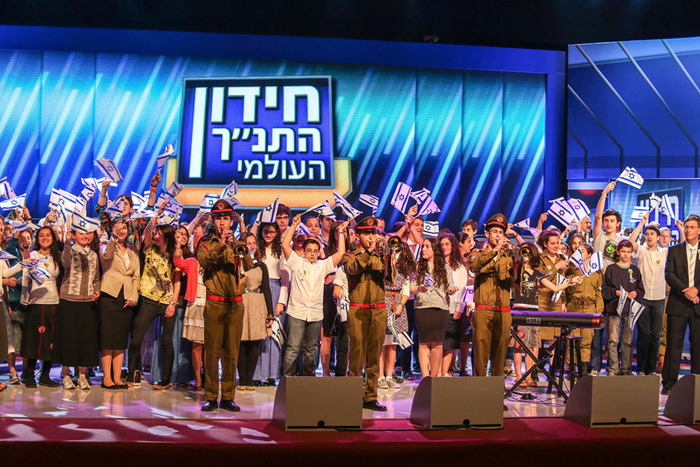 The International Bible Contest for Youth is held annually in Jerusalem. Photo courtesy of Jewish Agency
The International Bible Contest for Youth is held annually in Jerusalem. Photo courtesy of Jewish Agency
Haifa gets a subway
1959
The Carmelit subway system opens in Haifa. It still operates today, and has the distinction of being one of the shortest subway routes in the world.
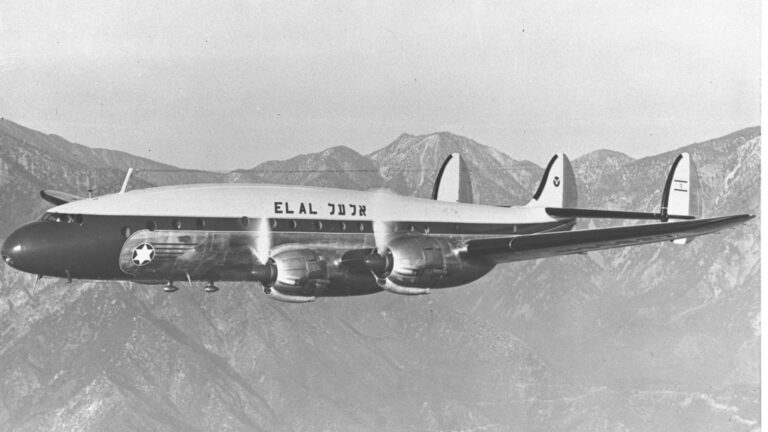
El Al flies nonstop to New York
1961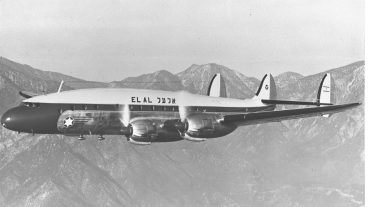
El Al Israel Airlines, established in 1948, begins flying nonstop between Tel Aviv and New York, setting a world record for the longest nonstop flight.
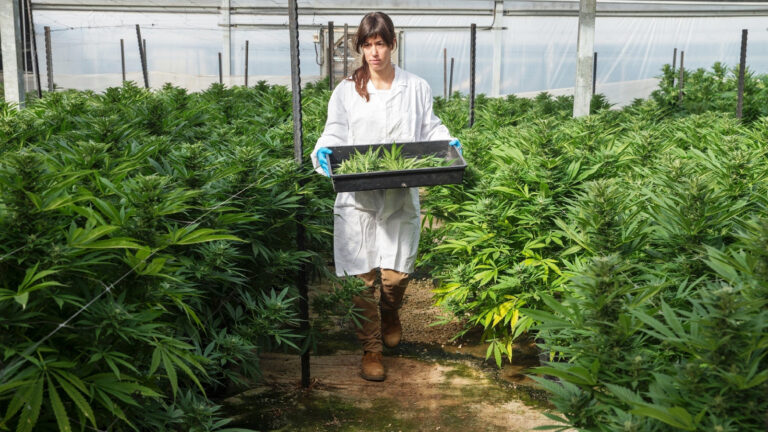
Israel takes its first major steps into cannabis research
1963
Hebrew University Prof. Raphael Mechoulam discovers the chemical structure of the active compounds in cannabis, including cannabidiol (CBD) and tetrahrocannabinol (THC), which is later used to treat seizures, among other disorders. Thanks to his groundbreaking work, Israel today dominates the cannabis research industry.
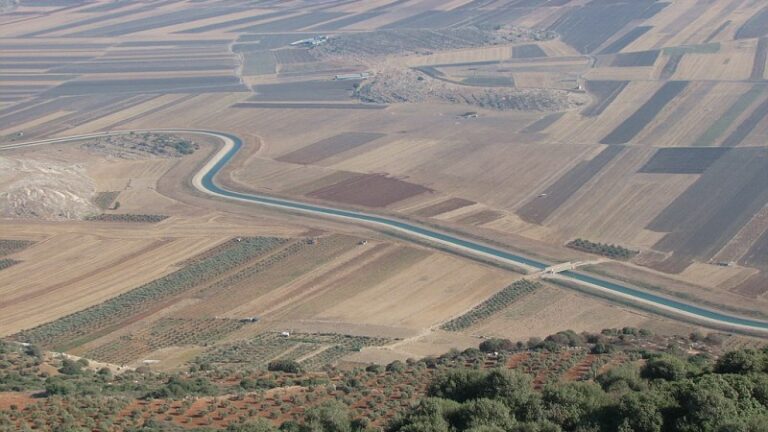
Water to the desert
1964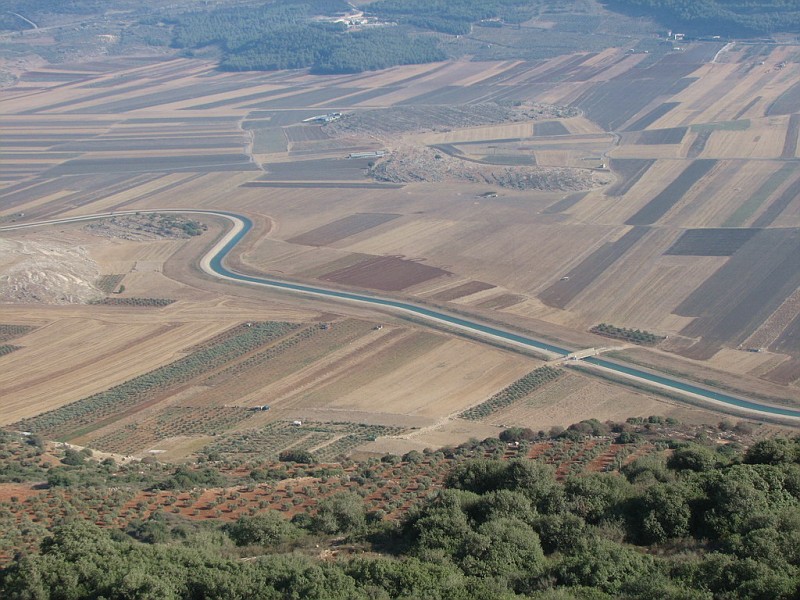
• The National Water Carrier is completed, bringing water from Israel’s north to the parched south. The development is a major step forward in enabling Israel to turn the Negev Desert into the center of crop production in Israel.
• Osem introduces Bamba, Israel’s favorite peanut snack. In 2015, A British study proved what Israeli parents had long suspected, that this addictive treat, given to children in Israel from a young age, could help prevent peanut allergies.
• Batsheva Dance company is founded by Martha Graham and Baroness Batsheva de Rothschild. It has become Israel’s premiere dance troupe.
• Motorola becomes the first US corporation to set up an R&D unit in Israel. The center initially develops wireless products and later moves into chip production.
Coca-Cola comes to Israel
1966- Coca-Cola comes to Israel, defying the Arab boycott. It opens one bottling plant in Tel Aviv and production begins two years later. The original plant still stands today on the same site, though the facility has been expanded to eight bottling lines that produce more than one million beverages a day. In the 1980s, Israel was one of the first countries worldwide to enjoy Diet Coke.
- Writer Shai Agnon (in English, S.Y. Agnon) wins the Nobel Prize in Literature.
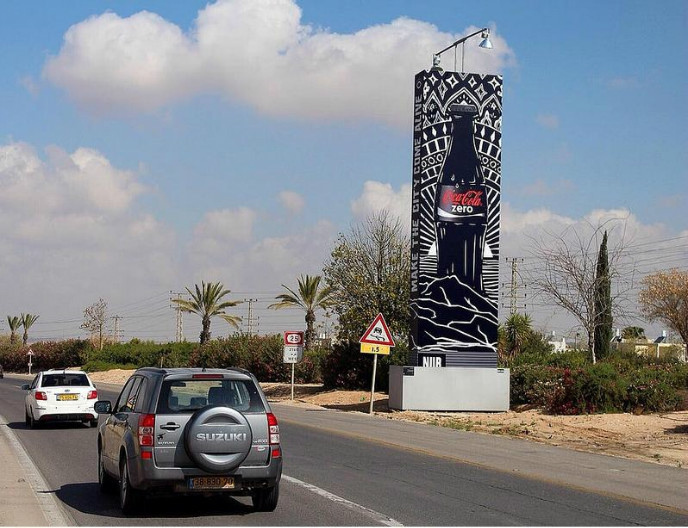
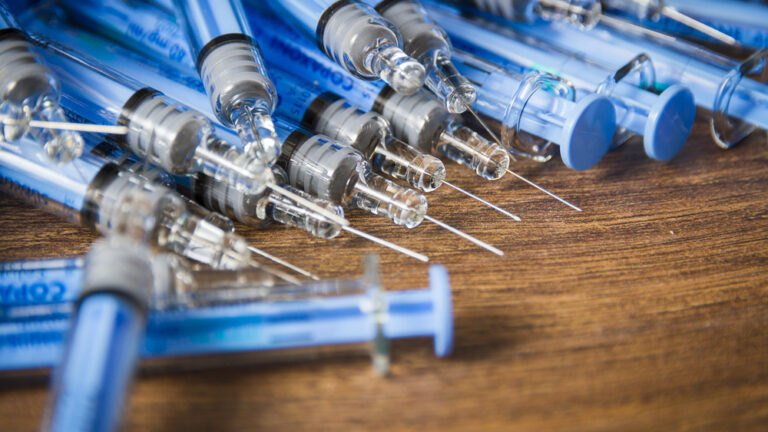
The research behind Copaxone begins
1967
• Michael Sela, Ruth Arnon and Dvora Teitelbaum begin experimenting with synthetic substances to reduce the symptoms associated with MS. Thirty years later, the FDA approves Copaxone, the drug the three developed along with Teva Pharmaceuticals.
• Ben-Gurion University of the Negev opens.
• Israel successfully overcomes attacks by Egypt, Jordan and Syria in the Six-Day War. In the wake of this unlikely victory, the historical and religious sites in the Old City of Jerusalem are rebuilt and become the most popular tourist destination in Israel.
Yael Arad is born, later wins Israel's 1st Olympic medal
1967
The first TV broadcast
1968Israeli TV shows its first-ever broadcast — the 20th Independence Day military parade.

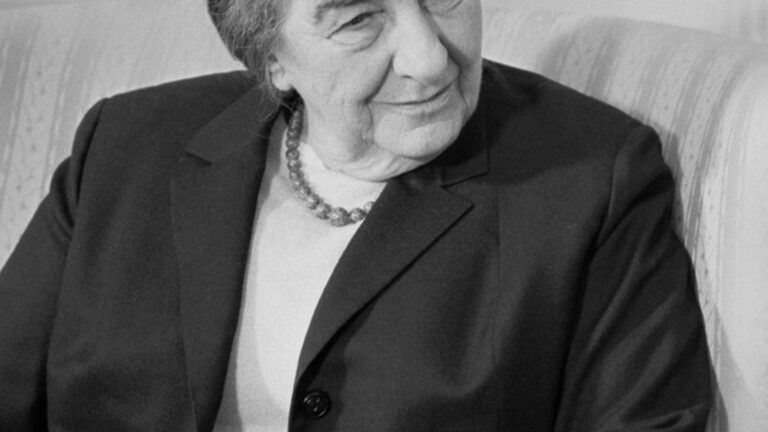
Office of the Chief Scientist is founded
1969• The Office of the Chief Scientist is founded, with the goal of increasing economic empowerment within the civilian sector of the Israeli economy and helping to spur Israel’s technological prowess for the decades to come. In 2016, the Office of the Chief Scientist was rebranded as the Israel Innovation Authority. Its role is to nurture and develop Israeli innovation resources, while creating and strengthening the infrastructure and framework needed to support the entire knowledge industry.
• Golda Meir becomes Israel’s first female prime minister.
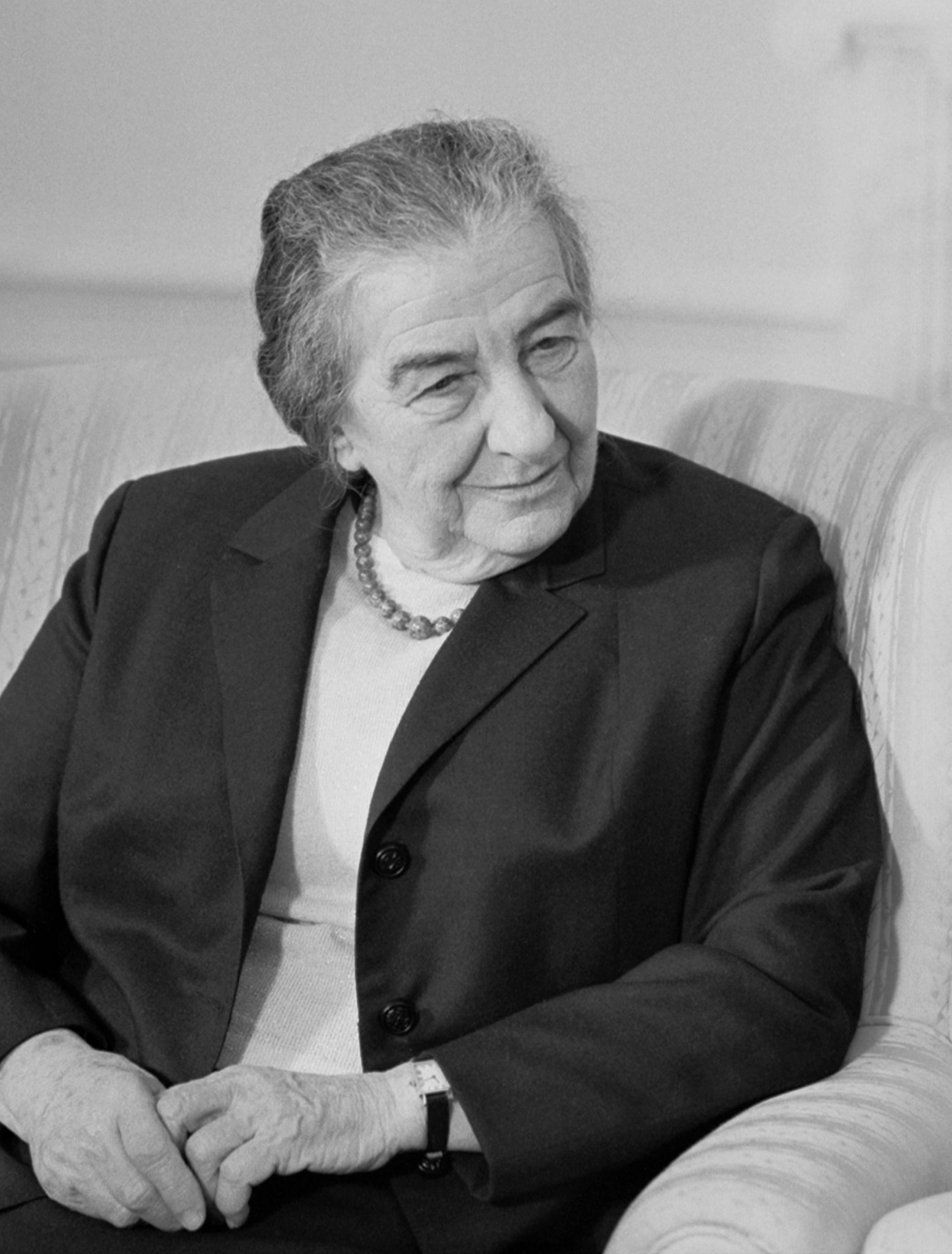
Three million citizens and counting
1971The three millionth citizen arrives in Israel on January 12. Absorption Minister Nathan Peled presents certificates to a 62-year-old Russian Jew, his wife and daughter. The daughter’s husband was not allowed to leave the USSR.
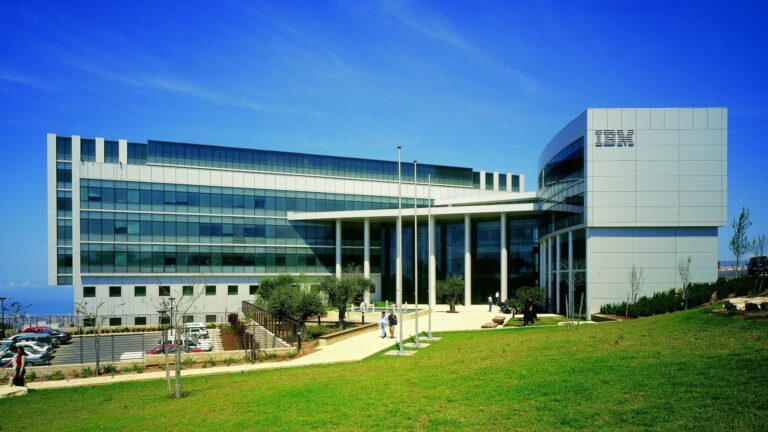
IBM Israel opens its doors in Israel
1972
The Israeli psyche may have been scarred when 11 Israeli Olympic team members were taken hostage and eventually killed along with a police officer by the Palestinian terrorist group Black September in the summer. But that didn’t stop international giants from casting their eyes toward Israeli talent. IBM Israel opened its first R&D center at the Technion’s Computer Science Building in Haifa. Today, more than 1,000 people work at IBM R&D offices across Israel.
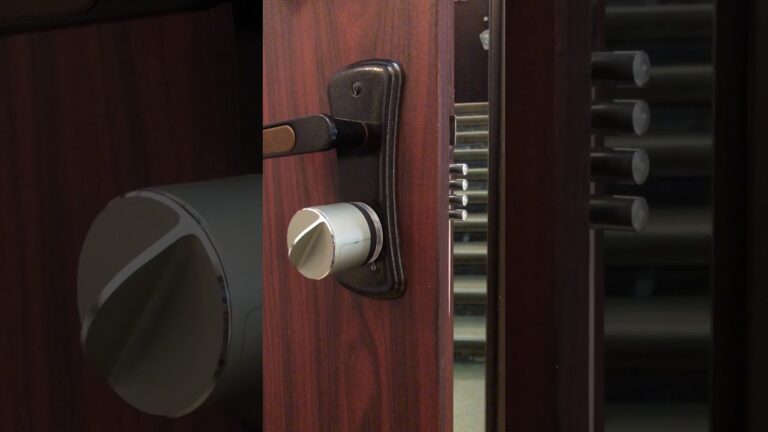
A revolution in locks
1973
In the same year that the Yom Kippur War breaks out, Avraham Bachri and Moshe Dolev invent the Rav Bariach geometric door lock, the cylinders of which connect throughout the door frame. The Pladelet (Hebrew for “steel door”) was the first steel security door introduced to the market, and by 1978 was the bestselling steel door in Israel. Today RB-Doors has sold more than four million steel doors throughout the world.
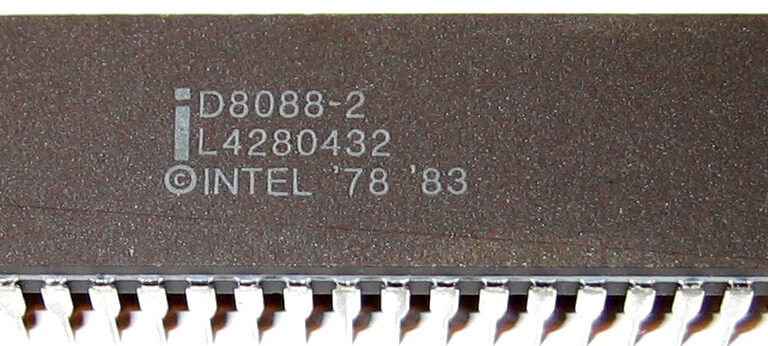
Intel arrives in Israel
1974
The Intel 8088 chip, designed in Israel. Photo courtesy Wikipedia Commons
Intel sets up a chip design center in Haifa, its first outside the US. The first PC microprocessor, the Intel 8088 chip, was designed here in 1978 and went on to dominate the desktop computer market. Other significant Intel chips, the Centrino and Sandy Bridge, also were developed in Israel.
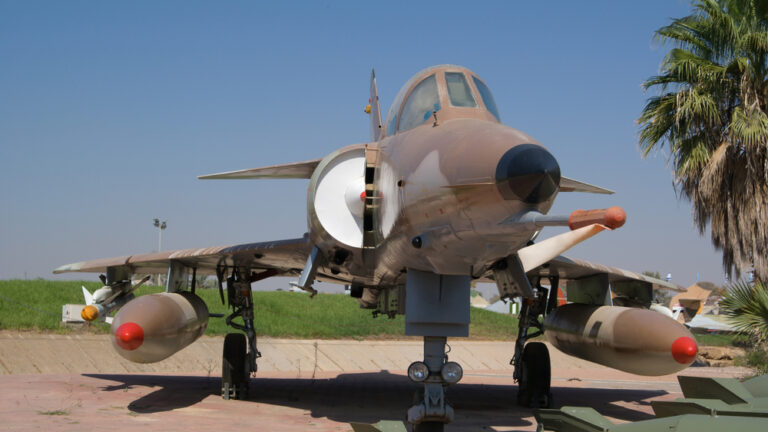
The first Israeli fighter jet unveiled
1975
Israel unveils its first locally manufactured fighter jet, the Kfir, on Independence Day. The Kfir became a mainstay of the Israel Air Force for 20 years, and was used by the US Navy and Marine Corps for air combat training.
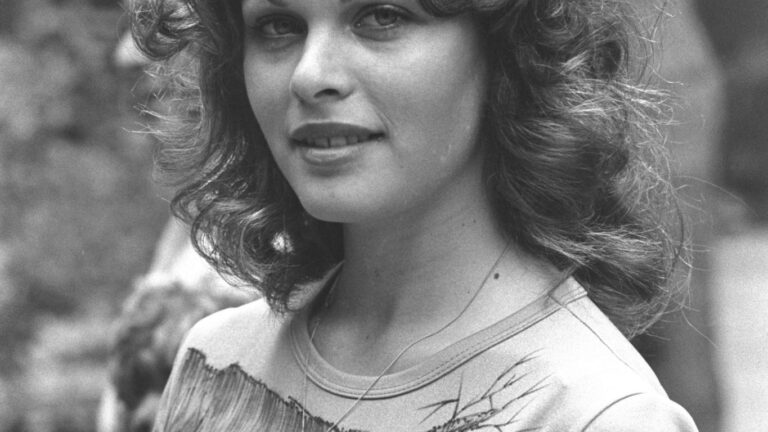
World's first automated library system invented in Israel
1976• A team of Hebrew University librarians, systems analysts and computer programmers launches an effort to create the world’s first automated library system, known as Aleph.
• Miss Israel Rina Mor wins the Miss Universe competition.
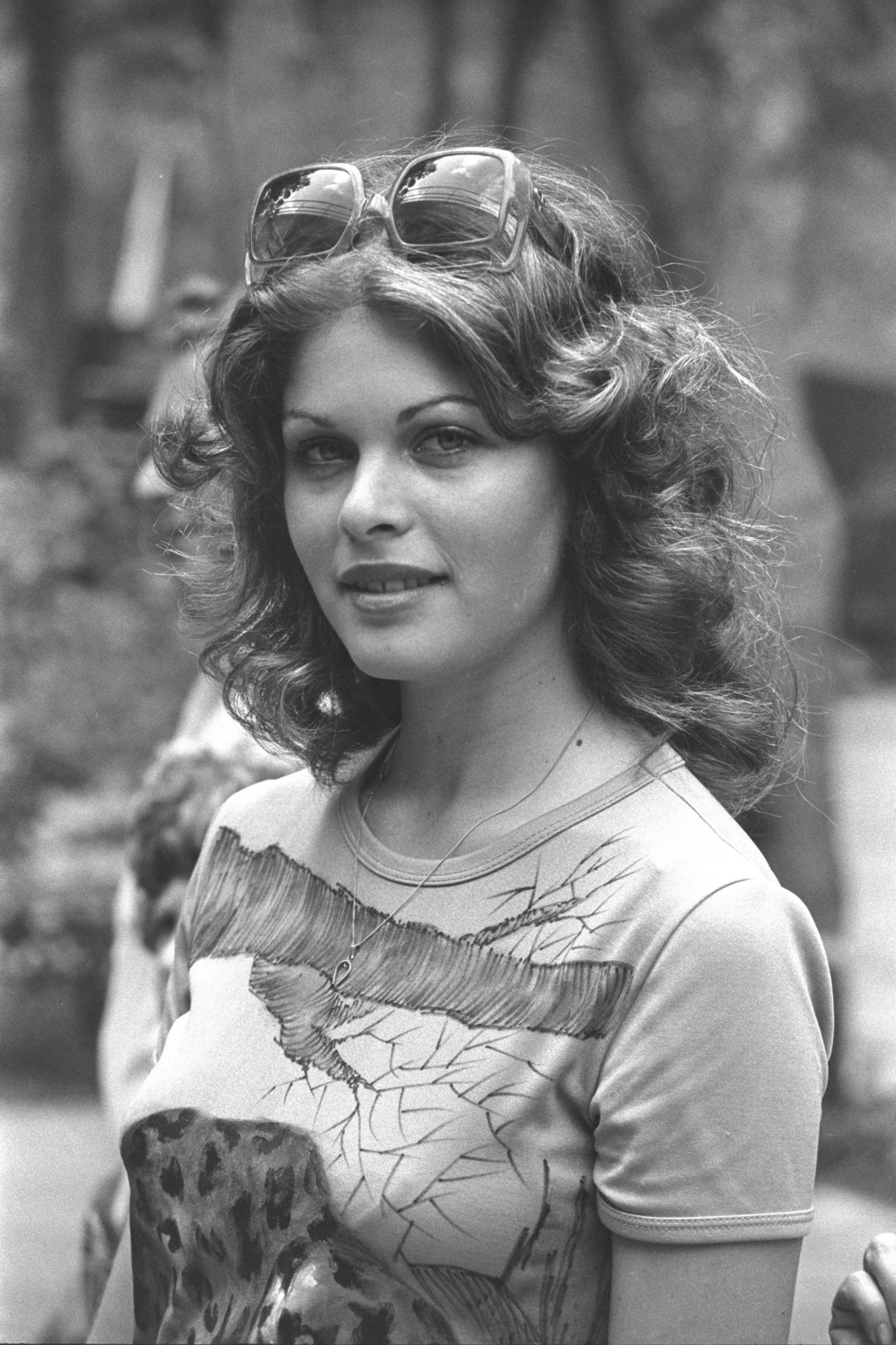
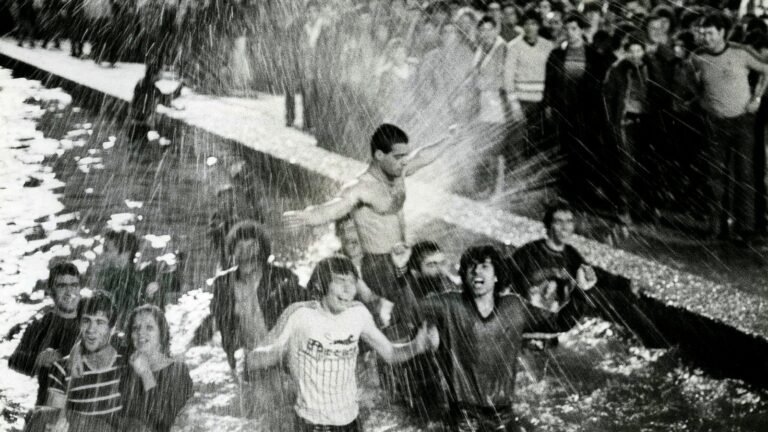
Maccabi Tel Aviv wins the European Basketball Championship
1977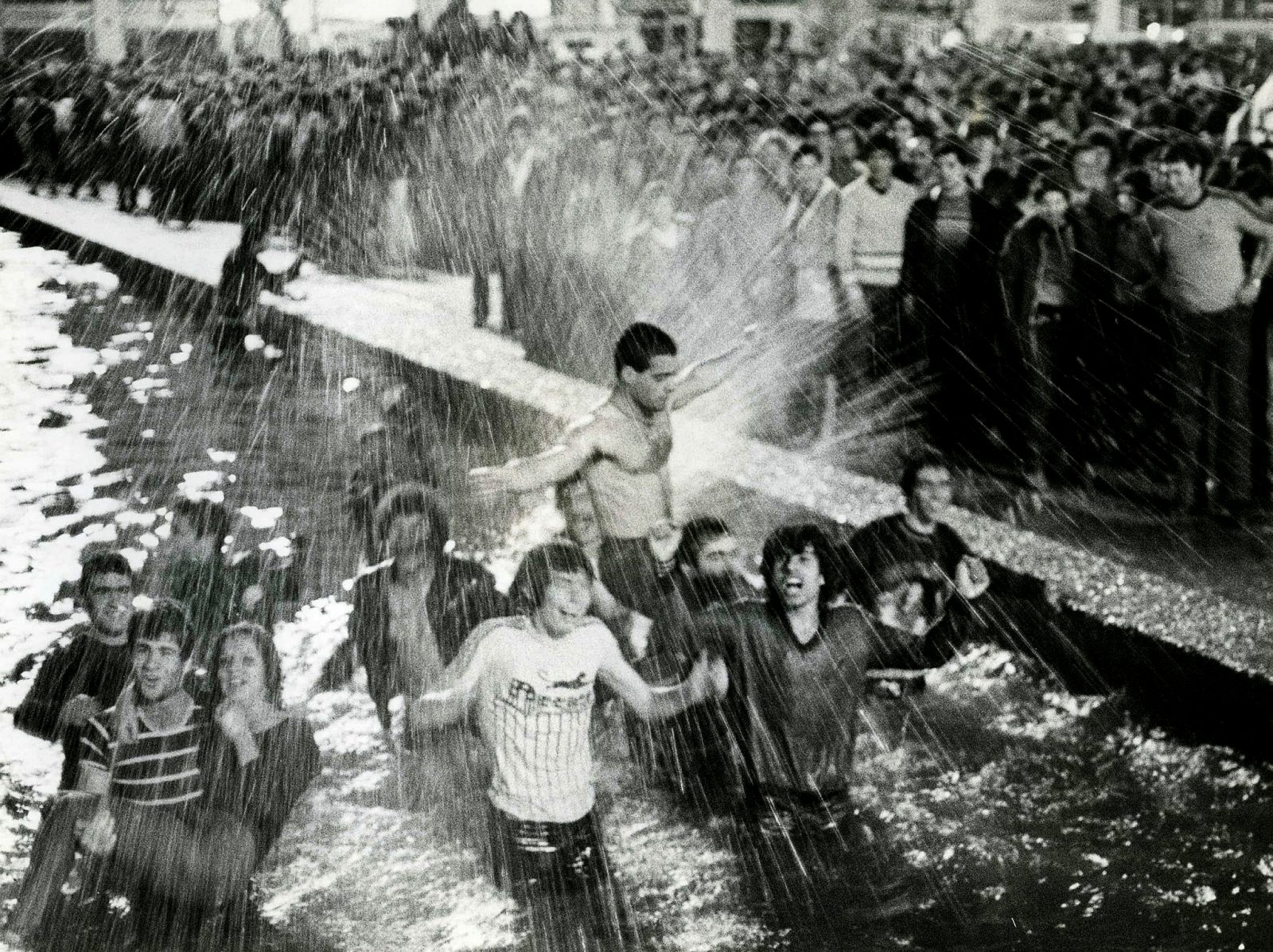
• Maccabi Tel Aviv wins the European Basketball Championship.
• Israeli director Moshé Mizrahi wins an Academy Award for Best Foreign Language Film for “Madame Rosa.”
• AfiMilk introduces the world’s first electronic milk meter.
• Rummikub, invented by a Romanian who immigrated to Israel in the 1930s, becomes the bestselling game in the United States.
Israel wins its first Eurovision Song Contest
1978• Israel wins the Eurovision Song Contest with “A-Ba-Ni-Bi” by Izhar Cohen and the Alphabeta. As a result, the next Eurovision Song Contest was held in Jerusalem the following year, when Israel won again — this time for the song “Hallelujah,” performed by Gali Atari and Milk and Honey.
• Israel sends its first medical team to respond to a foreign crisis, in Cambodia.
A new way to treat multiple sclerosis and Milky arrives
1979• Weizmann Institute Prof. Michel Revel discovers a novel way to treat multiple sclerosis by experimenting on foreskin. His research leads to the development of Interferon-beta (Rebif), one of the leading drugs to treat MS. The drug was approved in Europe in 1998, and in the US in 2002. It is now marketed worldwide by multinational companies Merck Serono and Pfizer.
• On the lighter side, Israel’s favorite chocolate pudding, Milky, debuts on the market. The pudding remains one of Israel’s most popular dessert snacks and most successful dairy products. The recipe for its whipped cream topping is known only to five people. In 1986, the Strauss company launched its first video commercial for this product called “Battle of the Milky,” which became a huge hit, spurring two more sequels and securing a spot in the Israeli entertainment lexicon.
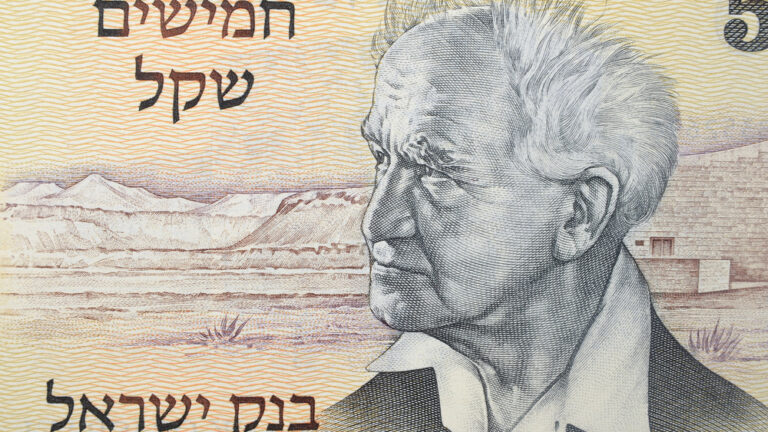
Introduction of the shekel
1980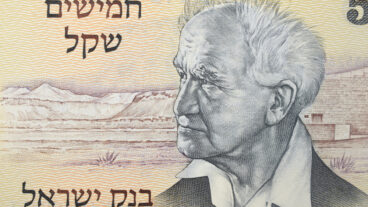
The lira is replaced by the shekel (1 shekel = 10 lirot) as Israel’s national currency. The word “shekel” derives from a biblical unit of weight of approximately one ounce (12 grams). The “new Israeli shekel” (NIS) introduced on January 1, 1986, is still in use, available in coin and banknote forms.
A wine revolution begins in the Golan Heights
1983• The Golan Heights Winery is founded, starting the “quality revolution” in Israeli wine. Golan helped transform the way Israeli wines are perceived worldwide, and firmly placed Israel on the world wine map.
• Mario Moshe Levi and Yaakov Nakash launch Bio-Bee Biological Systems at Kibbutz Sde Eliyahu, which cultivates bees, wasps, and mites for pest control and natural pollination on farms across the world.
• Israel creates a national search-and-rescue unit to respond to domestic and foreign disasters.
Operation Moses brings Ethiopians to Israel
19847,000 Ethiopian Jews are flown to Israel from Sudan in a covert mission called Operation Moses to rescue them from famine and civil war. Over a seven-week period, 30 flights each bring around 200 Ethiopians to Israel. In 1991, Operation Solomon brings a further 14,000 Ethiopian Jews to Israel over a period of 36 hours.
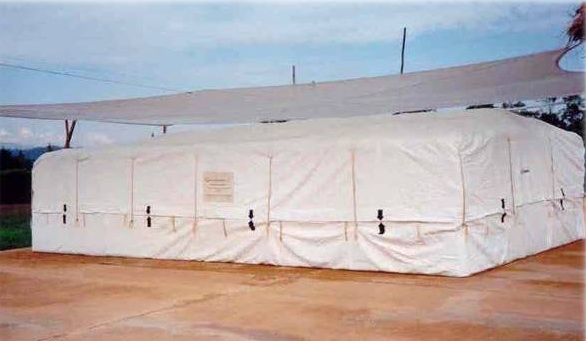
Farmers get a helping hand with the grain cocoon
1985
Prof. Shlomo Navarro of the Ministry of Agriculture’s Volcani Agricultural Research Organization develops the GrainPro Cocoon, a large, hermetically sealed bag for crops that doesn’t require pesticides. GrainPro has sold millions of the Cocoons in developing countries on several continents, enabling farmers for the first time to protect their grain harvests from insects, rodents and mold.
Arava R&D is created to make the modern desert bloom
1986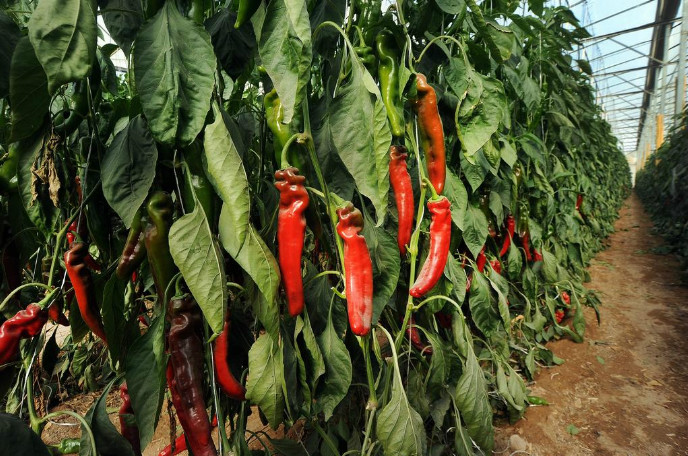
The Jewish Agency launches Arava R&D to develop cutting-edge agriculture and aquaculture technologies in the Arava Desert on the 112-mile strip of the Negev between the Dead Sea and Eilat. Once a barren land, the Arava becomes home to hundreds of farms for vegetables and ornamental flowers and fish, providing the majority of Israeli produce for export.
A map of migratory routes reduces bird-plane collisions
1987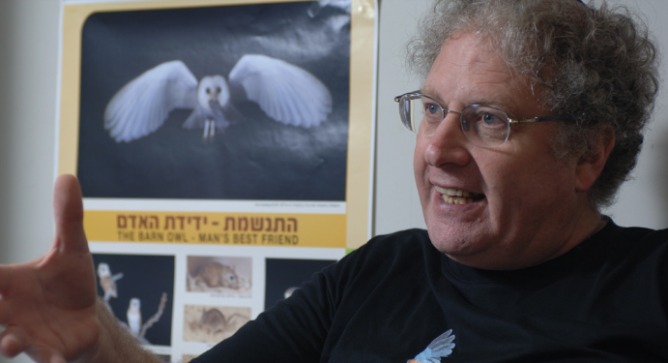
• Tel Aviv University Prof. Yossi Leshem’s precise map of the one billion birds that fly over Israel each year leads to a reduction in the collision rate between birds and planes by 76 percent, saving almost a billion dollars.
• Dr. Morris Levi performs the first heart transplant Israel, at Beilinson Hospital (now Rabin Medical Center) in Petah Tikva. The recipient, Yitzhak Sulam of Jaffa, was a 42-year-old Bank Leumi employee suffering from terminal heart disease.
A coexistence champion is born
1987IDF sends aid to Armenia
1988The Israel Defense Forces sends a total of 120 medics and rescue workers to Armenia to help find and treat survivors following a devastating earthquake, in addition to four tons of equipment. Israel also sets up a portable field hospital for children to aid young victims of the quake.
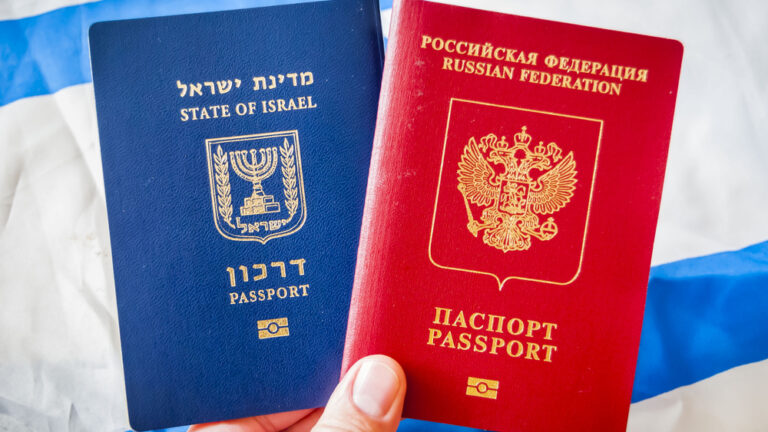
Russian Jews begin to emigrate to Israel en masse
1989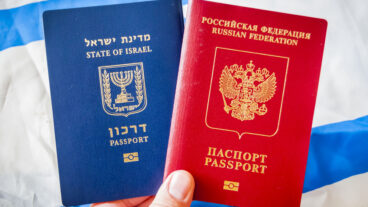
Start of mass immigration of Jews from the former Soviet Union. Between 1989 and 2006, more than one million Russians emigrated to Israel, transforming the culture, high-tech industry, education system and politics of the country. Many of the well-educated new immigrants gave Israel’s developing high-tech industry a valuable boost. Migrants from the former Soviet Union now make up 15 percent of the Israeli population, and one in four staff members at Israel’s universities are native Russian speakers, with an even higher concentration in the sciences.
Lifesaving Emergency Bandage is invented
1990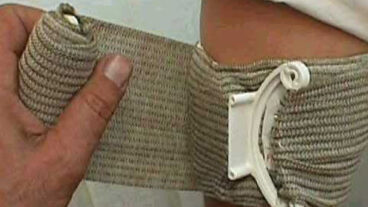
• Former IDF medic Bernard Bar-Natan develops the Emergency Bandage, which instantly controls massive bleeding with a patented pressure applicator and prevents infections in trauma situations.
• First used by medics during a NATO peacekeeping operation in Bosnia and Herzegovina, the product was nicknamed “The Israeli Bandage” by US troops after it became a standard of care in the American army. In 2011, this made-in-Israel bandage was credited with saving the lives of US Rep. Gabrielle Giffords and others who were shot in an Arizona parking lot.
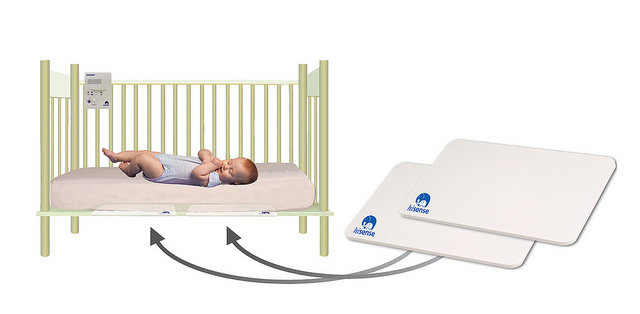
The Babysense monitor is developed
1991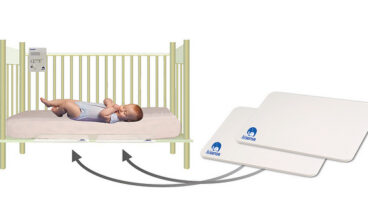
Using a sensor pad under a crib, Haim Shtalryd develops the first modern baby breathing monitor and begins marketing it through the company Hisense. The Babysense monitor can detect and prevent Sudden Infant Death Syndrome, the leading cause of death in infants under a year old in the US and Europe. Today, the monitor is used in hospitals and private homes all over the world.
Alon Day is born, later becomes Israel's 1st NASCAR driver
1991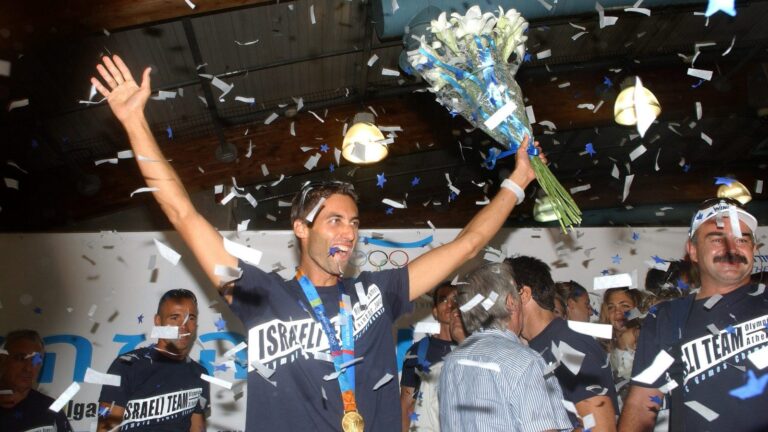
Israel wins its first Olympic medals
1992Israel wins its first two Olympic medals in its 10th Olympic appearance, in judo. Judoka Yael Arad wins a silver medal and her teammate Oren Smadja wins bronze. Since then, Israel has won seven more bronze medals and a gold — by Gal Fridman in men’s windsurfing in 2004.

Israel's high-tech industry takes off and Jackson visits
1993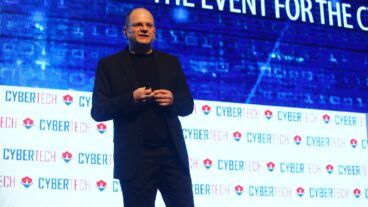
• Israel’s high-tech industry kicks into gear with a number of significant players emerging this year.
• Check Point Software is founded by Gil Shwed, Shlomo Kramer and Marius Nacht, who create the first firewall to protect corporate and personal data online; Benny Landau’s Indigo launches E-Print 1000, revolutionizing the digital printing industry; and husband-and-wife team Imad and Reem Younis launch Alpha Omega, now the largest Arab high-tech company in Israel, creating the industry standard for devices that act as a GPS inside the brain for deep brain stimulation procedures for neurological disorders.
• The Oslo Peace Accord signed this year increases investment interest in Israel, as does a new government initiative, the Yozma Program, which offers tax incentives to foreign venture capital investments in Israel. The country’s new high-tech cluster, “Silicon Wadi,” begins to emerge.
• Michael Jackson performs in Israel as part of his Dangerous tour, becoming one of the first major performers to appear in Israel. He plays two concerts at Yarkon Park in Tel Aviv for a total of about 170,000 fans. Mobbed by fans everywhere he goes, Jackson is rumored to have had Tel Aviv’s Dizengoff Mall opened specially for him on the eve of Rosh Hashana so he could buy records and books.
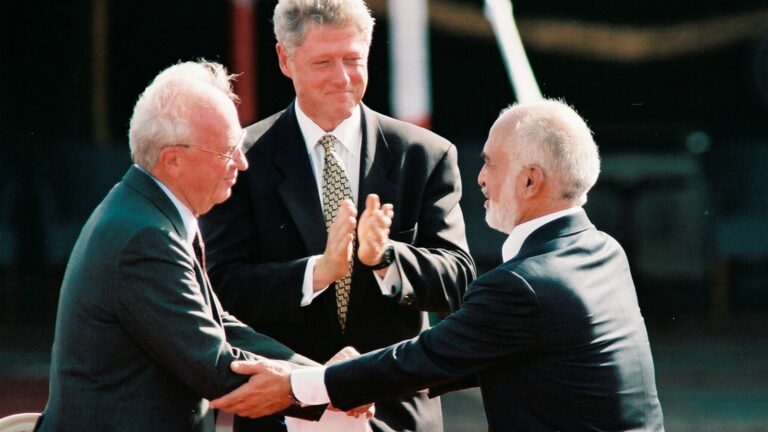
Peace with Jordan
1994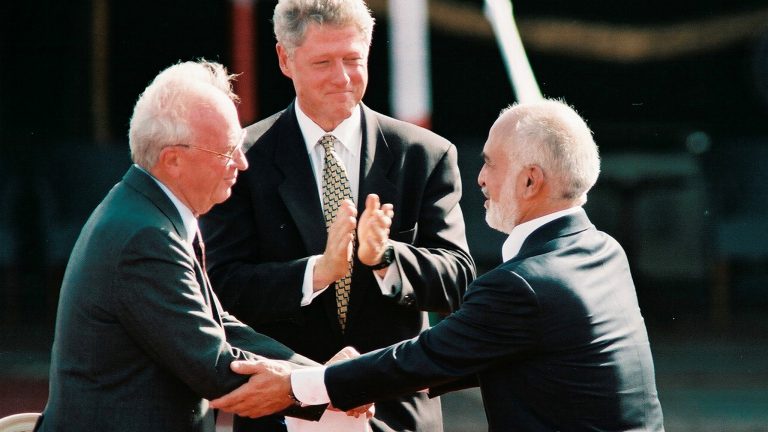
Israel and Jordan sign a peace treaty and subsequently open their borders, allowing tourists, business people and workers to travel freely between the two countries.
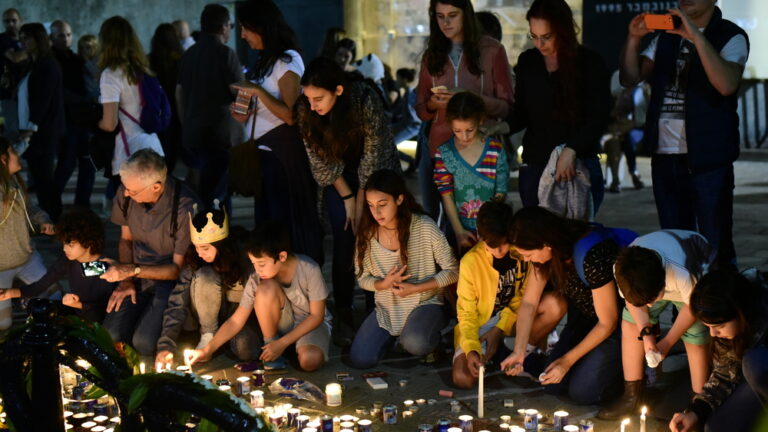
Save a Child's Heart is founded
1995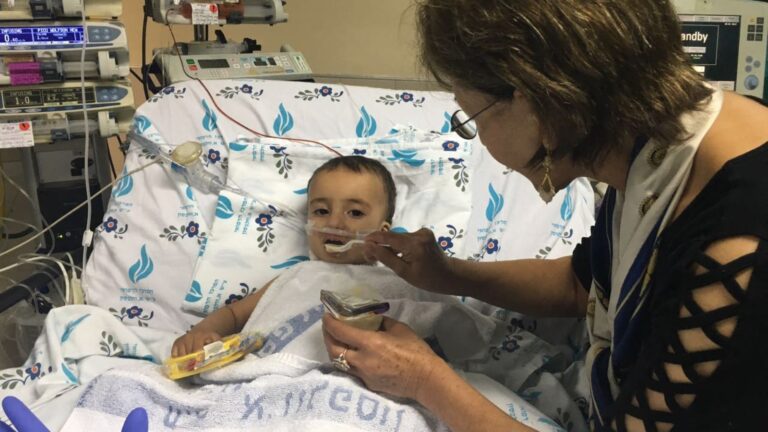
• The non-profit organization Save a Child’s Heart is founded at Wolfson Medical Center in Holon, offering free heart surgery to children from developing countries all over the world, including Gaza and the Palestinian Authorities. To date, Save a Child’s Heart has saved the lives of more than 4,500 children from 56 countries in Africa, South America, Europe, Asia, and throughout the Middle East and trained more than 150 medical personnel from these countries.
• The country was plunged into mourning on November 4, 1995, when Prime Minister Yitzhak Rabin was assassinated after giving a speech in Kings of Israel Square, Tel Aviv. That location’s name was changed to Rabin Square.
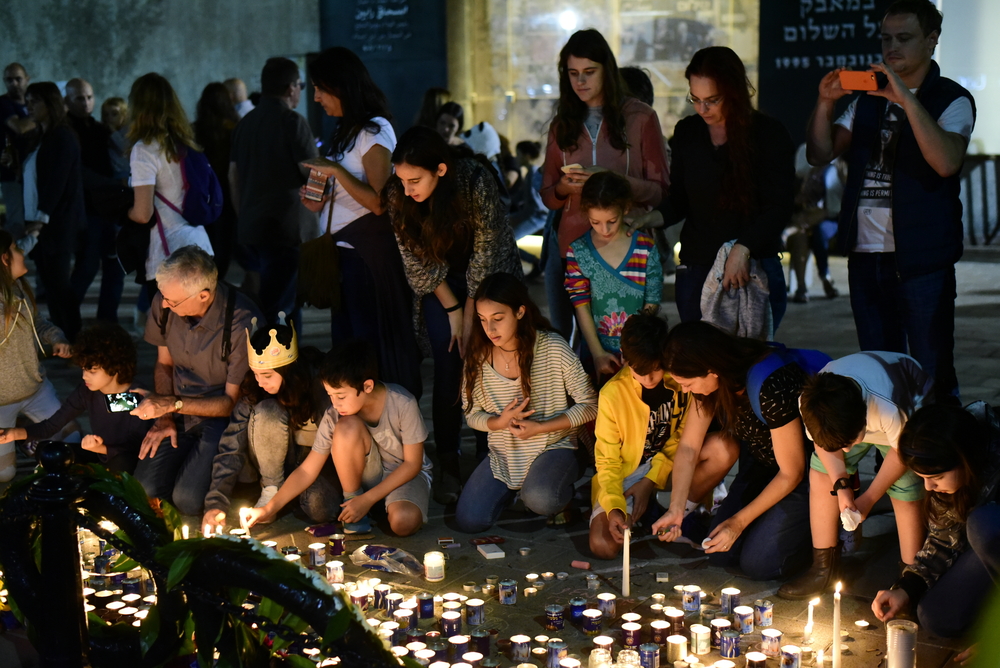

Rasagiline identified as potential Parkinson's treatment
1996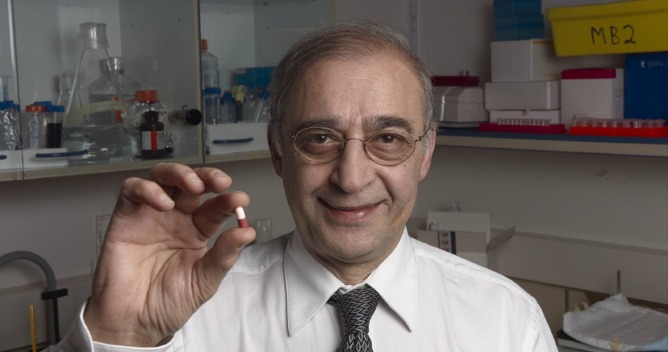
• Technion Prof. Moussa Youdim publishes a paper claiming the compound Rasagiline can fight Parkinson’s disease. Three years later, Israeli drug company Teva Pharmaceuticals develops Azilect and begins marketing it in Europe (2005) and the United States (2006).
• Jerusalem celebrates its 3,000th anniversary of King David establishing it as his capital city.
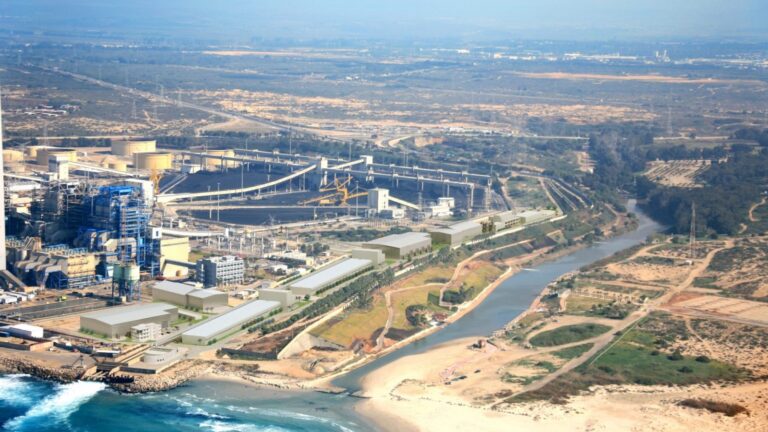
First desalination plant opens
1997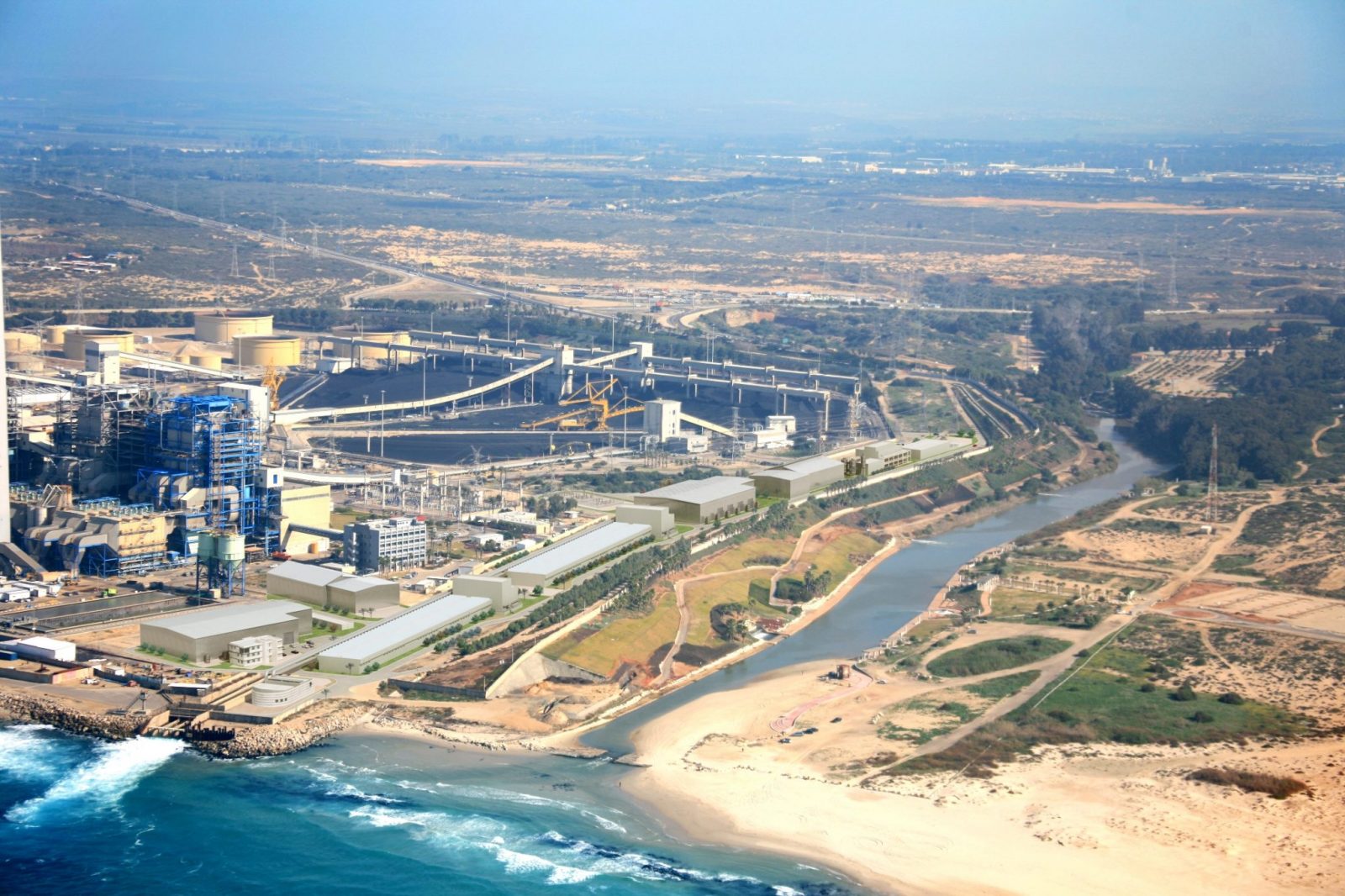
the Hadera Desalination Facility. Photo courtesy IDE Technologies
• Israel opens its first reverse osmosis desalination plant, in Eilat. Since then, five more desalination plants have opened along Israel’s Mediterranean shore — in Ashkelon, Palmachim, Hadera, Soreq and Ashdod — providing about 60 percent of domestic water needs. Though not without some environmental issues, these plants have helped relieve Israel’s chronic water shortages.
• Jaap van Rijn files his second patent for a unique zero-discharge system for fish farming anywhere, using extremely limited amounts of water and without harming the environment, enabling farmers to raise fish even in the desert.
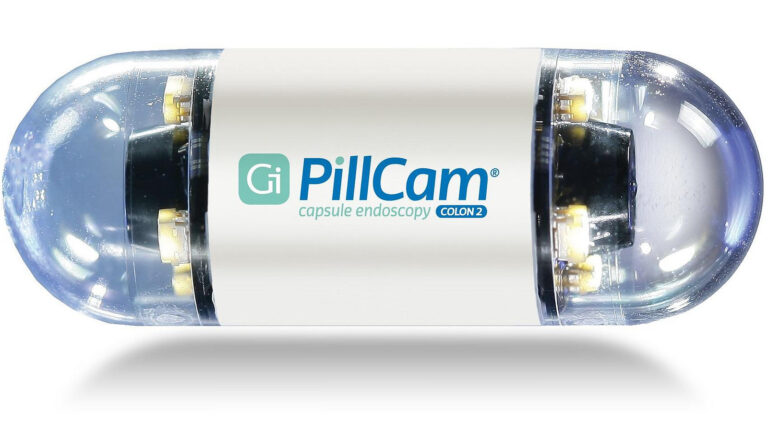
ICQ spurs a dot.com boom
1998• Four young Israeli technology pioneers — Arik Vardi, Yair Goldfinger, Sefi Vigiser and Amnon Amir — sell their messaging program, ICQ, to America Online for $407 million. The free messaging program took them less than two months to build. Their first investor was Arik’s father, Yossi Vardi, considered one of the godfathers of Israel’s high-tech industry.
When they sold the company, Mirabilis, they had no revenues, but had some 100 million users worldwide. The success of the company, which revolutionized communication over the Internet, triggered a dot-com boom in Israel. Thousands of startup companies were founded as young entrepreneurs across Israel tried to emulate their success.
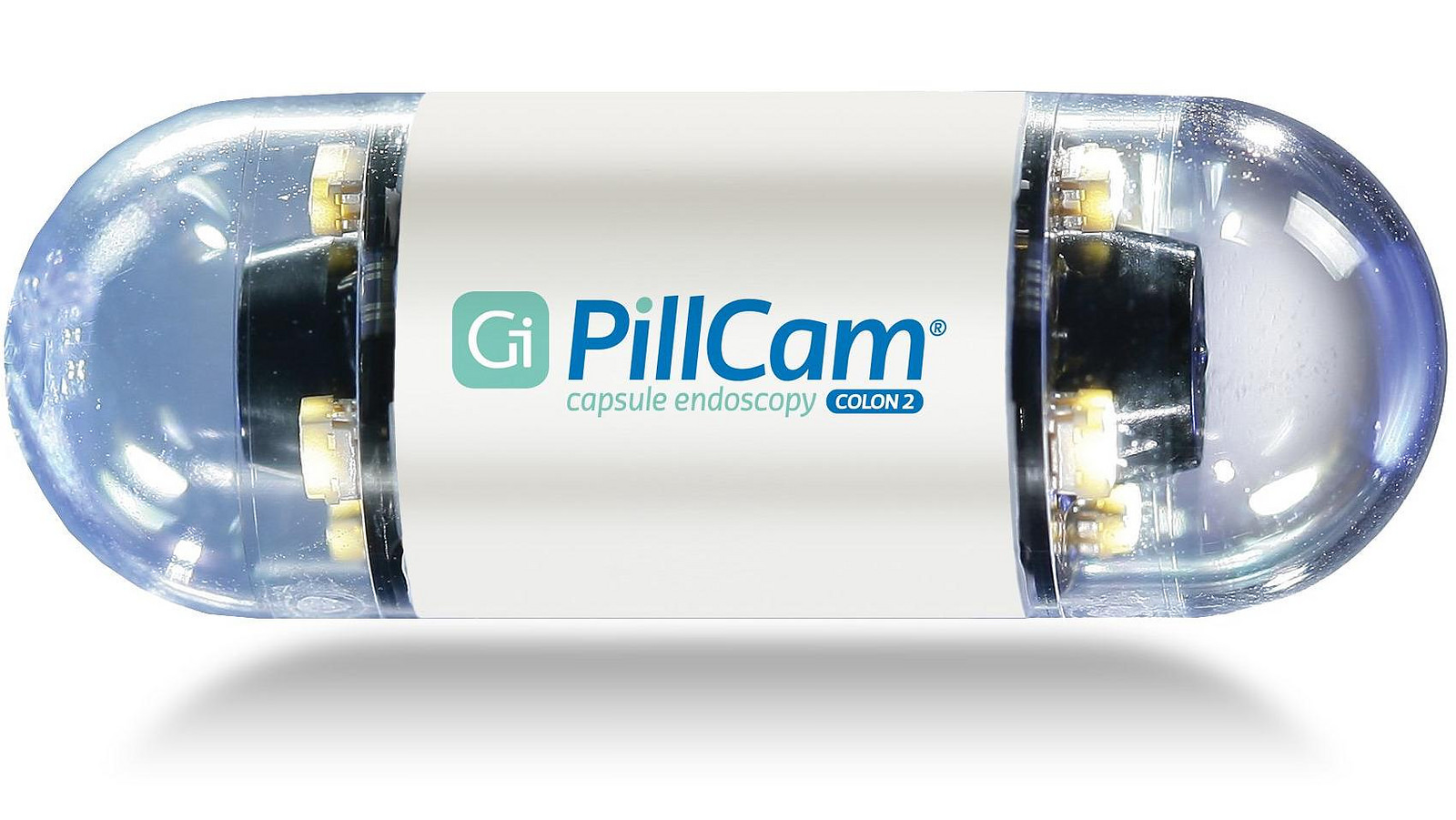
• Newsweek names Tel Aviv one of the 10 most technologically influential cities in the world.
• Given Imaging, developer of the PillCam miniature camera in a capsule for diagnosing and treating gastrointestinal diseases, is founded. Dr. Gabi Iddan, who worked in the missile division of Rafael, came up with the idea when he realized that missile technology could be miniaturized to create a medical product. The company revolutionized GI diagnostics, and in 2013 was sold to Irish company Covidien for $860m.
• Linor Abargil is the first Israeli to be crowned Miss World; and transgender Sharon Cohen (Dana International) wins the Eurovision Song Contest with her song “Diva.” She released the single in Europe where it was a hit.

Mobileye revolutionizes accident prevention in vehicles
1999
Amnon Shashua and Ziv Aviram launch Mobileye, a system to prevent accidents by warning drivers of a dangerous situation, using research Shashua developed at Hebrew University. The company was listed on the New York Stock Exchange in 2014 following the largest IPO of an Israeli company in the US.
In March 2017, Intel acquired Mobileye for $15.3 billion, the largest exist in Israel’s high-tech industry to date. Mobileye technology is installed in cars from most major automakers and will figure prominently in autonomous vehicles.
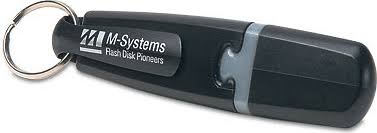
The DiskOnKey is launched
2000
• M-systems launches the the world’s first flash drive, the DiskOnKey. The device, which is smaller, faster and has significantly more storage capacity than a floppy disk or CD, is as ubiquitous today as the paper clip. Founder Dov Moran sold the company to SanDisk in 2006 for $1.6 billion.
• Optics network company Chromatis is acquired by Lucent for $4.7 billion.
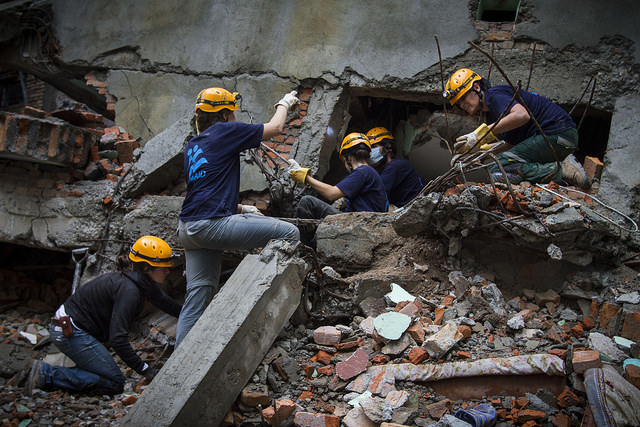
IsraAID is founded to provide humanitarian aid worldwide
2001
• NGO IsraAID is founded to provide lifesaving disaster relief and long-term support across the world. The organization has since sent professional medics, search-and-rescue squads, post-trauma experts and community mobilizers to help after humanitarian disasters in Greece, Haiti, the United States, Nepal, Japan, Kenya, Jordan, Sierra Leone, Greece, Mexico and the United Kingdom, among others. As of 2018, IsraAID has responded to crises in 46 countries and has ongoing programs in 20 countries, helping populations move from crisis to reconstruction/rehabilitation and to sustainable living.
• Mazor Robotics creates a guidance system that enables spine surgeons to create a three-dimensional blueprint of the spine from a CT image. The robotic spine and brain surgery products are based on technology pioneered by Prof. Moshe Shoham from the Technion-Israel Institute of Technology. The company’s first product, SpineAssist, was approved by the FDA in 2004. Mazor’s next-generation Renaissance Guidance System is now installed in about 100 medical centers around the world (more than half in the United States) for biopsies, reconstructive surgery, scoliosis correction, spinal fusion and other delicate operations.
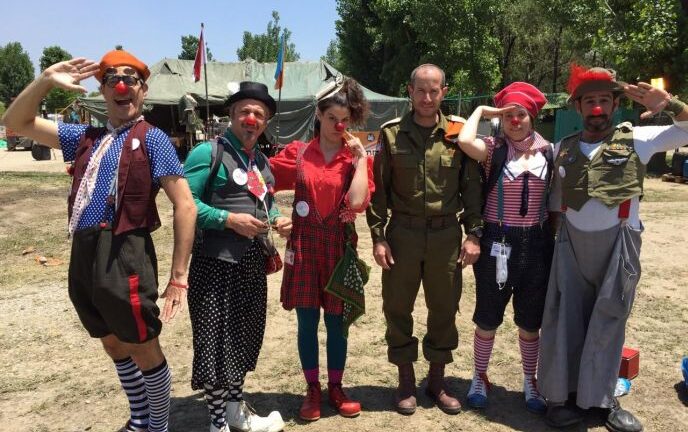
Kahneman wins a Nobel
2002• Pyschologist Daniel Kahneman receives the Nobel Prize in Economics for his work on behavioral economics and the psychology of judgment and decision-making, even though he never took a single economics course. Kahneman’s book “Thinking, Fast and Slow,” which summarizes his research, was published in 2011 and became a bestseller. In 2015, he was listed as the seventh most influential economist in the world by The Economist.
• The non-profit Israel Trauma Coalition is founded. The ITC partners with more than 60 organizations including NGOs, government ministries and Home Front Command to create care in the trauma field, strengthening community resilience and ensuring emergency preparedness. In 2018 alone, the ITC has sent experts to help in the wake of the Parkland school shooting, and to offer long-term support to the victims of last year’s hurricane in Texas.
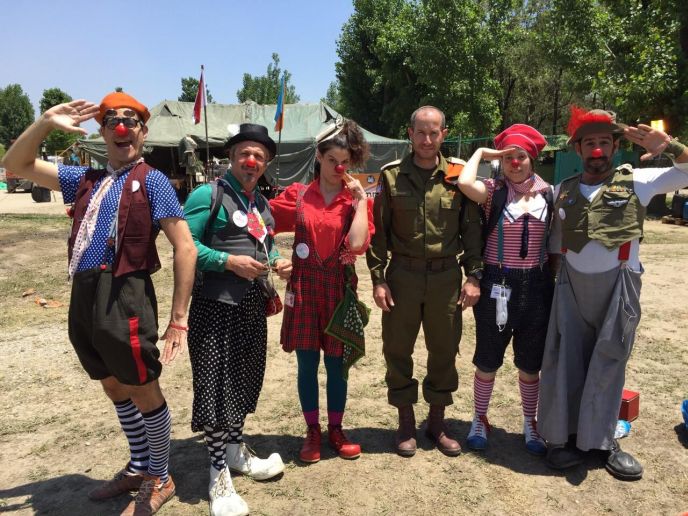
• Dream Doctors is founded and revolutionizes the field of professional therapeutic clowning, helping Israel to become the world leader in this field. Today, Dream Doctors work in 29 hospitals across Israel in more than 30 different departments, from the emergency room to surgery, maternity wards, oncology and autism clinics. Israel sends Dream Doctors on its aid missions around the world. The clowns work hand-in-hand with doctors and nurses as they treat both adults and children.
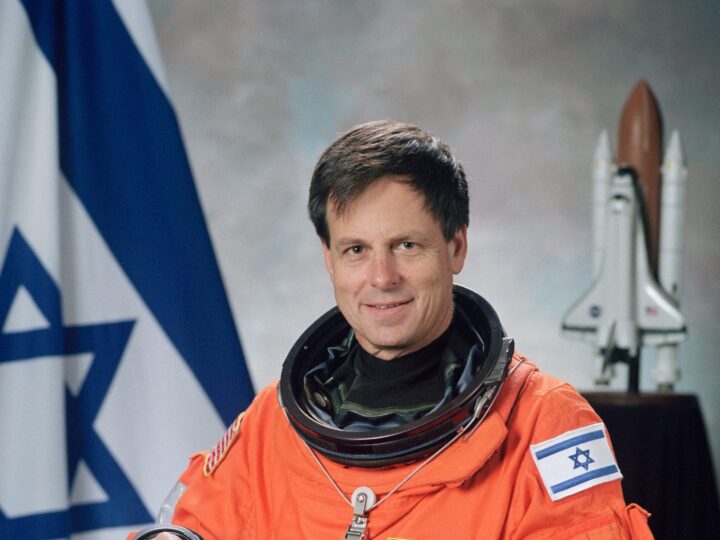
Ilan Ramon dies aboard Columbia space mission
2003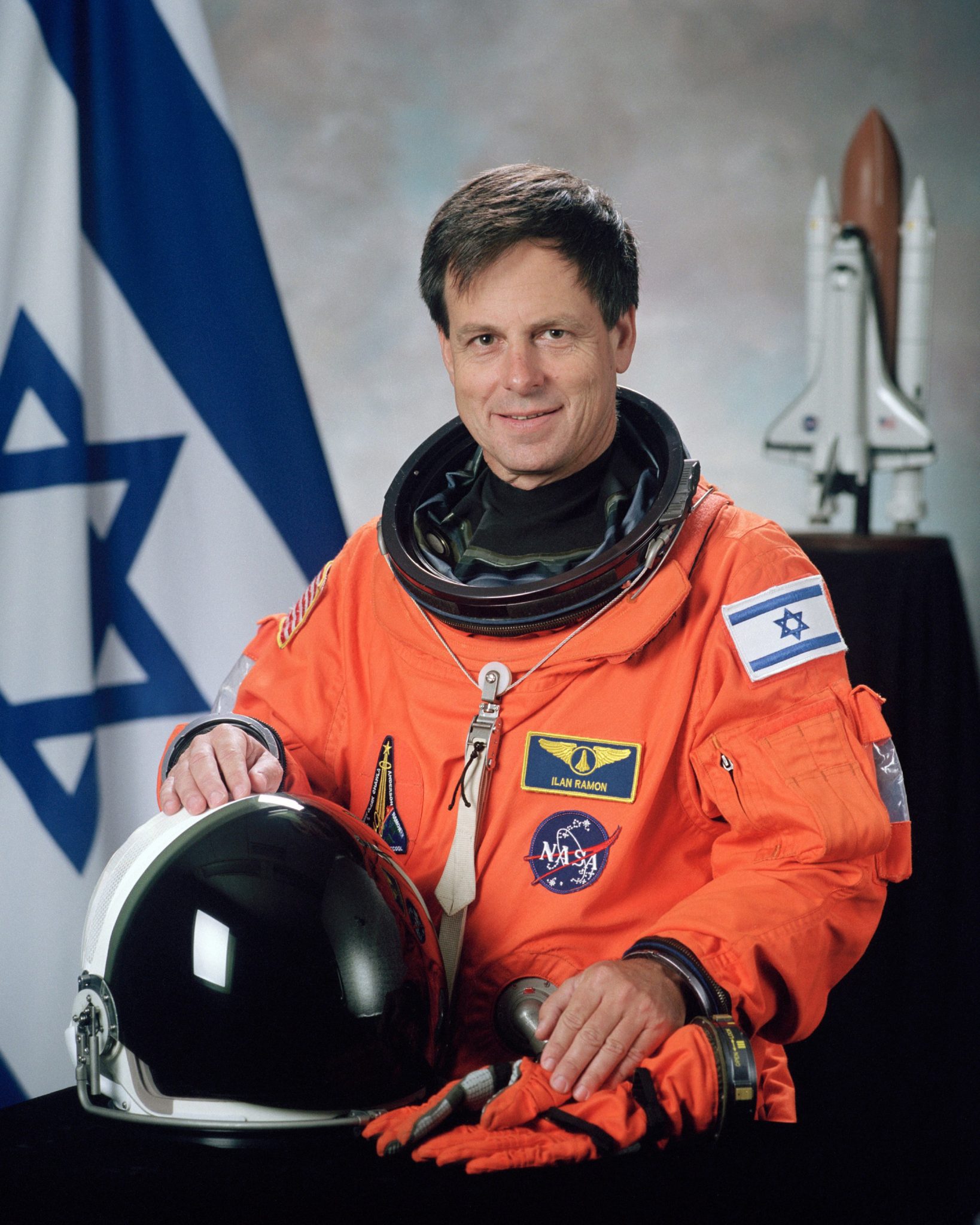
• Israel celebrates and then mourns when Ilan Ramon, the nation’s first Israeli astronaut for NASA, takes part in the STS-107 Columbia space mission. Ramon, an Israeli fighter pilot, was the space shuttle payload specialist. He and the other six crew members, who conducted about 80 experiments during their 16-day mission, died when the shuttle blew up on re-entry to Earth. Somehow, 37 pages of Ramon’s diary survived the crash and were given to his wife, Rona. Eilat’s new airport is to be named the Ilan and Asaf Ramon International Airport after Ramon and his son, Asaf, who died at age 29 on an F-16 training flight.
• Brainsway is founded to develop a medical device for transcranial magnetic stimulation as a noninvasive treatment for depression. Today, the US Navy uses the product as part of a comprehensive treatment approach to depression for service people and their families.
Tel Aviv is declared a World Heritage Site
2004• Tel Aviv is declared a World Heritage Site for its cluster of Bauhaus buildings. Some 4,000 white Bauhaus buildings in Tel Aviv led to its nickname, the White City. They were built between 1931-1956 by immigrant architects trained in Europe who adapted the Modern style to suit Tel Aviv’s culture and desert climate. Today many of these old buildings have been refurbished and 1,500 more are slated for restoration.
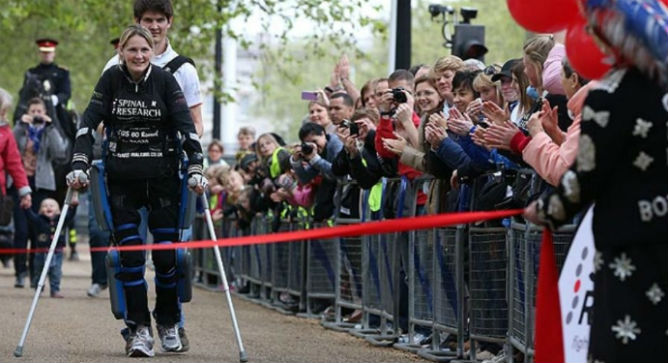
• After an accident leaves electronics engineer Amit Goffer a quadraplegic, he founds Argo Medical Technologies to develop a system that will allow wheelchair users to walk and climb stairs.
“We aim to end the 200-year monopoly of the wheelchair,” he said. The ReWalk robotic exoskeleton was launched a few years later to widespread acclaim and commercial interest. Argo Medical has also developed a revolutionary standing wheelchair, the UpNRide, and is working with Harvard University on a soft exoskeleton to help MS and stroke patients regain mobility.
• Aaron Ciechanover and Avram Hershko from the Technion – Israel Institute of Technology, won the Nobel Prize in chemistry for their discovery of ubiquitin-mediated protein degradation.
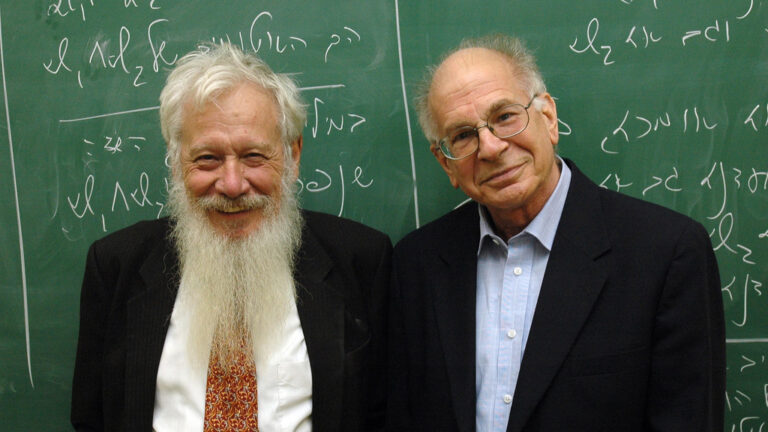
Another Nobel Prize and aid to New Orleans
2005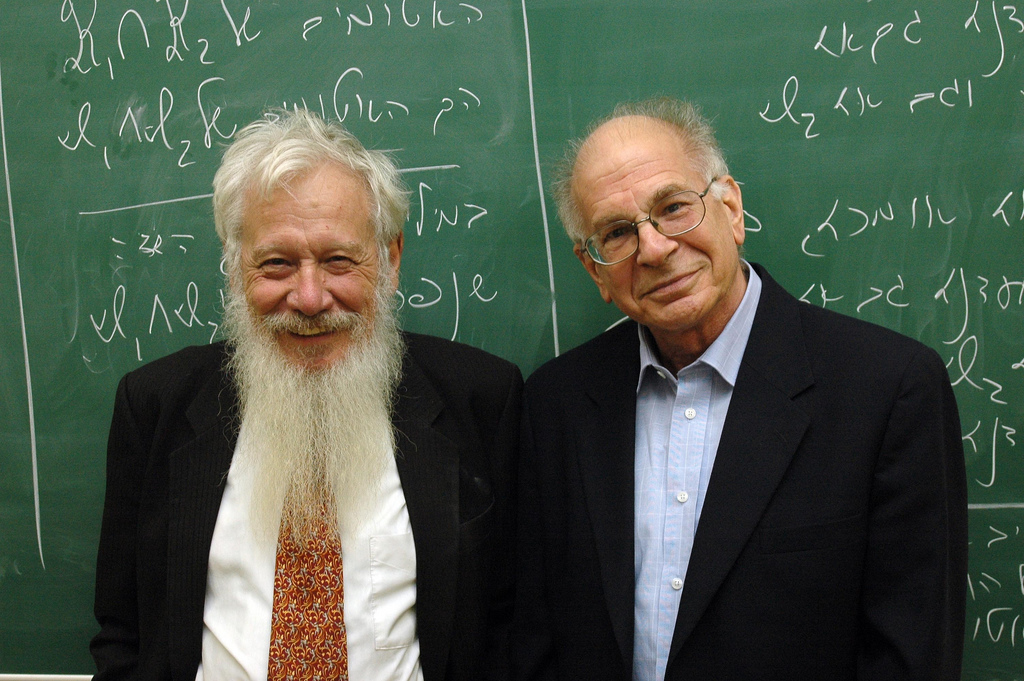
• In the year that Microsoft’s Bill Gates calls Israel a high-tech superpower, Prof. Robert Aumann of the Hebrew University of Jerusalem wins the Nobel Prize in Economics along with Prof. Thomas Schelling of the University of Maryland for their work “enhancing our understanding our understanding of conflict and cooperation through game-theory analysis.”
• Israel sends significant aid to New Orleans in the wake of Hurricane Katrina. The following year, Dr. Naomi Baum, an Israeli expert in psychotrauma, initiates the Building Resilience in Schools Project in New Orleans with the help of the United Jewish Communities, The Mental Health Association of Mississippi and the Israel Trauma Coalition. The project trains teachers, social workers, school nurses and counselors to help school children affected by the tragedy.
• Using ancient seeds found in Masada in the early 1960s, Dr. Sarah Sallon and Dr. Elaine Solowey resurrect the Judean date palm, one of the early Levant’s most important plants.
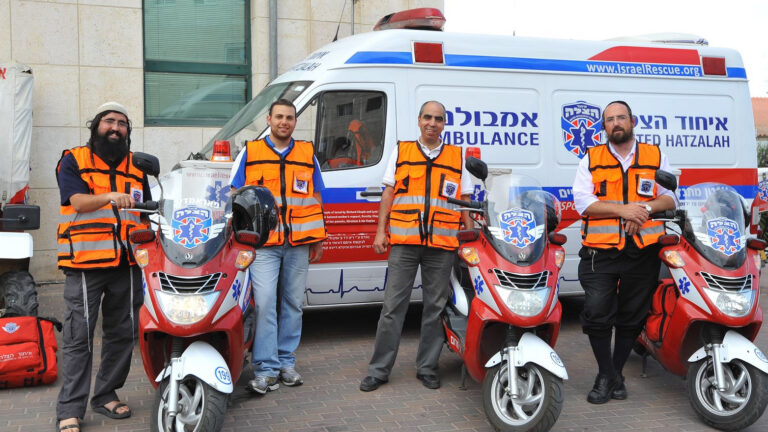
Eli Beer founds United Hatzalah
2006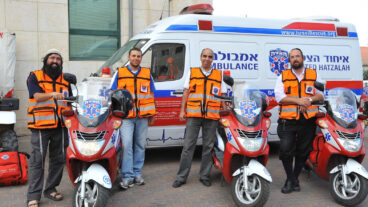
• Despite the 34-day Lebanon War in July, the high-tech industry continues to grow quickly. Aside from the $4 billion Iscar buyout, Hewlett-Packard purchases Mercury Interactive for $4.5b, the largest acquisition of an Israeli high-tech company.
• New tech companies founded this year include Internet advertising company Outbrain and WIX, a web-development platform that now has 90 million users in 190 countries.
• In biotech, work began to develop Exelon, the first drug approved for treating mild to moderate dementia associated with Parkinson’s disease.
• Israel’s national emergency medical service, Magen David Adom in Israel, is inducted as an official member society of the Red Cross and Red Crescent movement after years of worldwide humanitarian aid as far back as World War II. Founded in 1930, MDA now counts 17,000 Arab-Israeli, Druze, Bedouin, Jewish, Muslim and Christian volunteers and 3,000 staffers, and also runs Israel’s National Blood Bank supplying hospitals and the IDF. MDA shares expertise and volunteers with many countries, including Haiti and Nepal after massive earthquakes.
• Eli Beer starts United Hatzalah of Israel, a network of volunteer neighborhood EMTs who often travel on ambucycles – refitted motorcycles nimble enough to weave through traffic. Today the organization has 4,000 EMTs, certified first responders, paramedics and doctors dispersed throughout Israel. The organization includes a mix of religions and races, and has won many awards. It has also taken part in many international lifesaving aid missions in the wake of disasters around the world and trains paramedics in other countries.
Good Deeds Day and NaNose are started
2007• Good Deeds Day is launched by Israeli businesswoman and philanthropist Shari Arison. It is now celebrated in more than 50 countries.
• Technion chemical engineering Prof. Hossam Haick begins developing the NaNose nano-artificial nose to detect various types of cancer and other diseases noninvasively through breath analysis. In 2016, Haick would be chosen as one of the GOOD 100 remarkable individuals tackling pressing global issues.

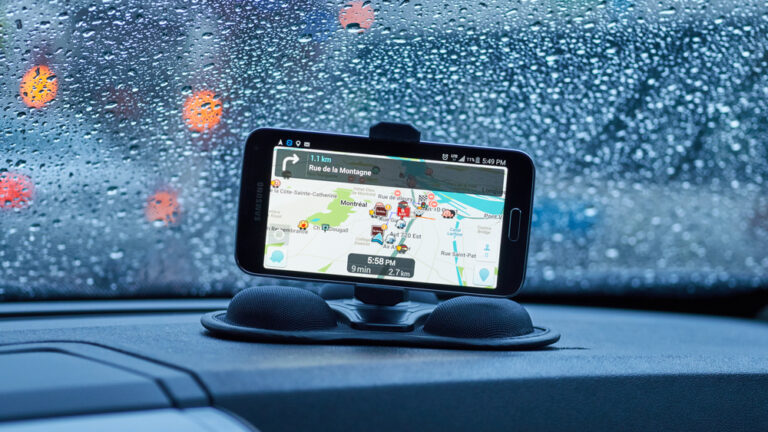
Israel helps the world go in the right direction
2008
• Driver navigation app Waze is founded by Israeli programmers Ehud Shabtai, Uri Levine and Amir Shinar using real-time updates and road conditions to reduce commute time and gasoline consumption. Google bought the company in 2013 for $1.03 billion, and today the app has 100 million monthly active users. Waze has been used in all sorts of situations, even in the wake of hurricanes to help residents fuel up.
• Amir Peleg launches Takadu, a software platform that marries big data and the cloud to monitor water networks. His system gives cities, municipalities, and countries the capability to check their water infrastructure and detect leaks and burst pipes, saving millions of gallons of water.
• Hebrew University Prof. Oded Shoseyov invents a system for turning animal or human waste into odorless powder without water or electricity.
• BriefCam launches its video synopsis and artificial intelligence platform. The award-winning technology is now used globally, including at the Statue of Liberty, and was pivotal in the investigation of the Oslo and Boston Marathon bombings.
• Leading wine critic Robert Parker declares 14 Israeli wines to be world- class vintages in his first review of the country’s industry.
• HBO launches “In Treatment” based on the Israeli program “BeTipul.” Since then, dozens of Israeli shows have been picked up by international TV producers.
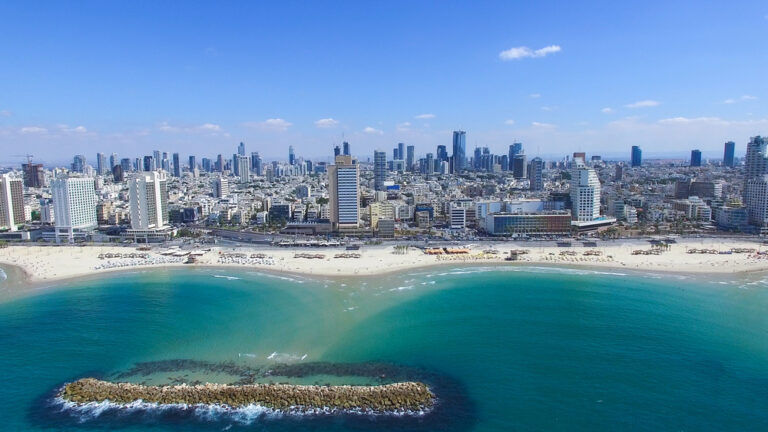
Tel Aviv celebrates its centennial
2009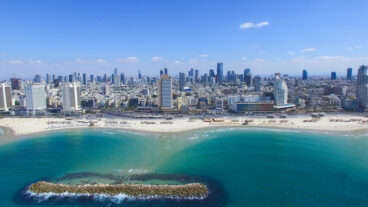
• Tel Aviv celebrates its 100th anniversary. In the last decade or so, Tel Aviv (which has both more vegans per capita and more dog owners per capita in the world) has won accolades from all over the world, being named third best city in the world by Lonely Planet, ultimate party city, best gay city, one of the world’s top action-packed cities, best beach party spot on the planet, best culinary destination, and even home to the most beautiful people in the world.
• Israeli basketball player Omri Casspi becomes the first Israeli to play in the NBA.
• Weizmann Institute crystallographer Ada Yonath becomes the first Israeli woman to win the Nobel Prize, and the first woman in 45 years to win the Nobel Prize for Chemistry.
• Oren Peli’s film “Paranormal Activity” becomes the surprise hit of the year.
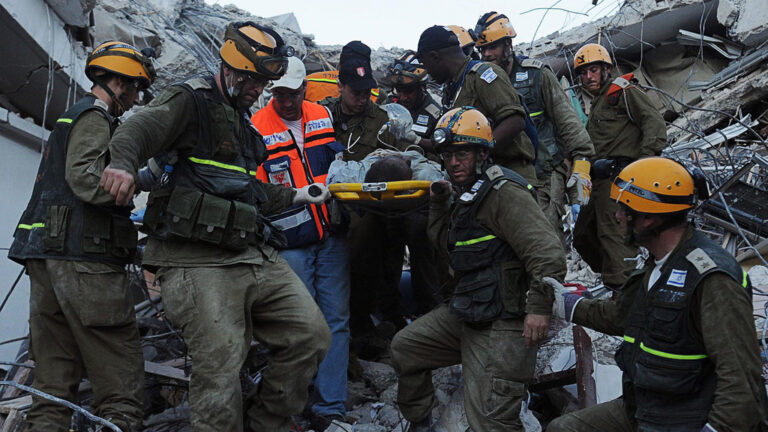
Israel sends aid to Haiti, wins prestigious prizes
2010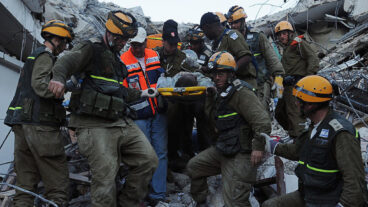
• Israel receives worldwide praise for the speed and efficiency with which it sent 220 doctors, nurses and aid workers and a field hospital to Haiti in the wake of a devastating earthquake in January.
• Israelis rush aid and personnel to Chile after an earthquake later in 2010, and in subsequent years would rush to help victims of earthquakes in New Zealand, Japan, Taiwan, Ecuador and Nepal — as well as natural disasters including typhoons, hurricanes and forest fires across the globe.
• On September 7, Israel becomes a full member of the Organization for Economic Co-operation and Development (OECD), a forum in which governments work together to seek solutions for common problems. This milestone is strategically important to Israel’s positioning as an advanced developed economy. Israel has become OECD’s No. 1 member country in terms of R&D expenditure as a percentage of GDP.
• Israeli mathematician Elon Lindenstrauss is the first Israeli to be awarded the Fields Medal, and Israeli author Etgar Keret receives the Chevalier (Knight) Medallion of France’s Order of Arts and Letters.
• Amnon Shashua and Ziv Aviram launch OrCam Technologies to develop wearable assistive technologies for people with visual impairment. In 2018, OrCam is valued at $1 billion.
• Israeli inventions during 2010 include Danny Peleg’s Hydrospin, a small rotating wheel that turns within a water pipe in order to generate an electrical current as a perpetual source of clean energy; and David Levy’s potato that can grow in hot, dry climates.
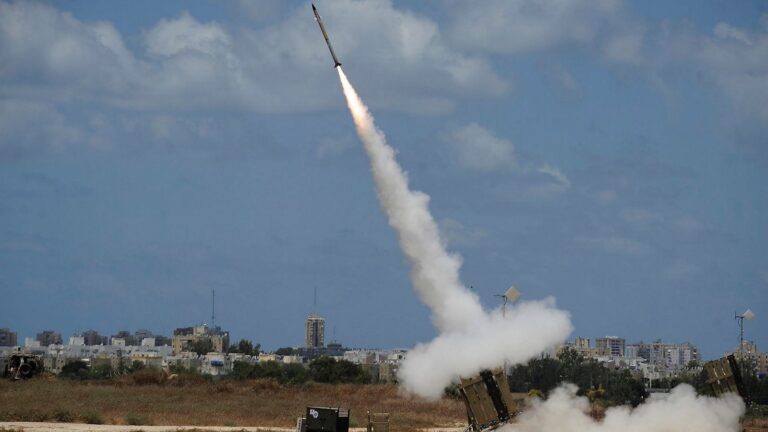
A Nobel Prize, Iron Dome, aid to Japan
2011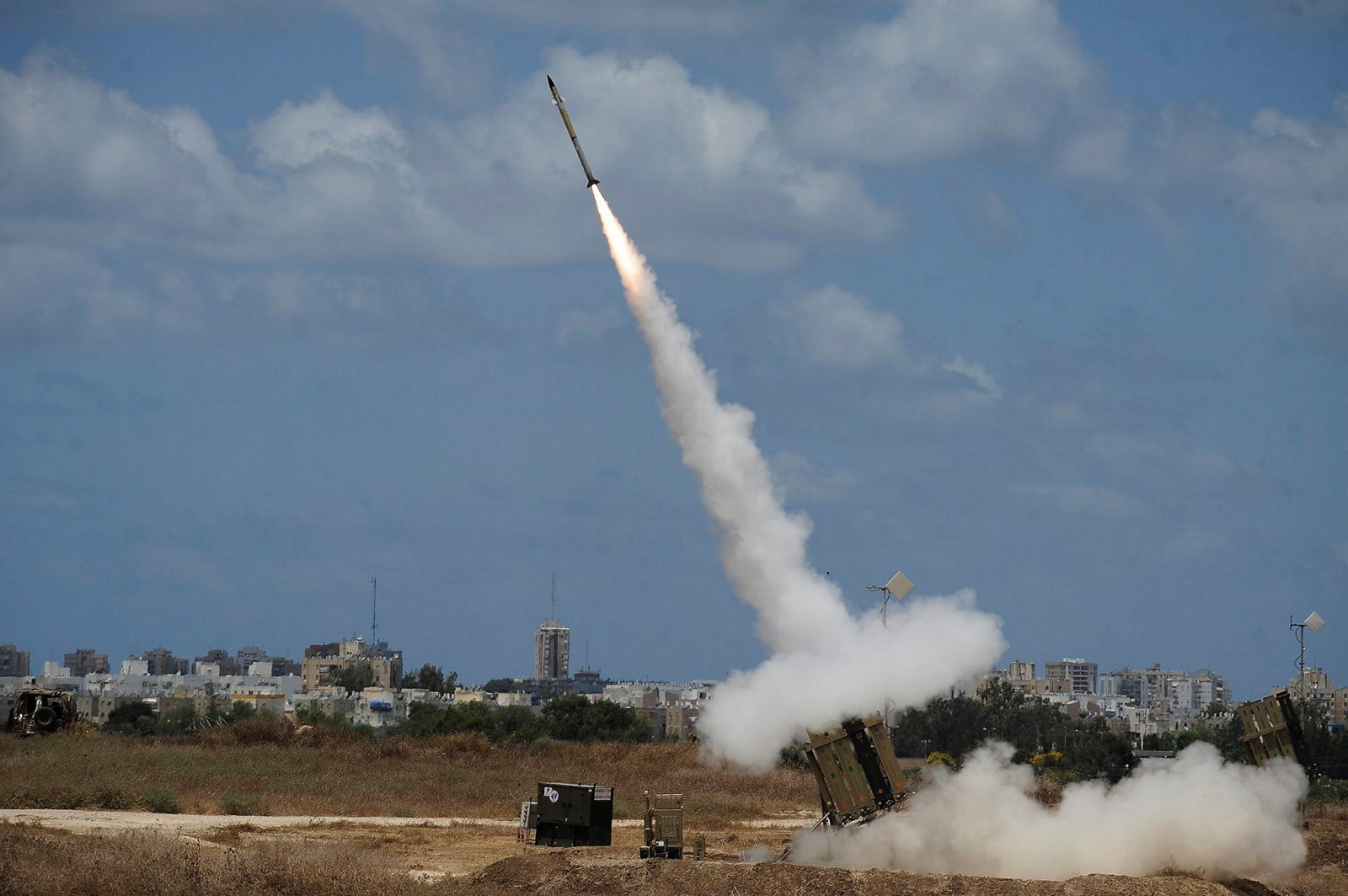
• A test of the revolutionary Iron Dome missile defense system intercepts a short-range rocket for the first time in history. Originally ridiculed as impossible, Iron Dome saved countless Israeli lives endangered by missiles fired from Gaza in the summers of 2012 and 2014, achieving an intercept success rate of 90 percent. In 2017, Israelis voted Iron Dome the country’s most innovative invention.
• Technion Prof. Daniel Shechtman wins the Nobel Prize in Chemistry for his discovery of the quasicrystal.
• SesameEnable is developed as the world’s first smartphone for people with severely limited use of their hands. The award-winning phone is powered by voice control and head tracking.
• HomeBioGas introduces the first highly efficient, easy-to-assemble system to turn organic household waste into clean renewable cooking gas and liquid fertilizer. HomeBioGas is now used in 90 countries, and the company sponsors deployment of systems in underserved communities to address health problems caused by indoor air pollution and methane gas emissions from organic waste.
• Israeli women’s basketball team Elitzur Ramla wins the women’s EuroCup final in France.
• Israel sends aid to Japan in the wake of the deadly earthquake and tsunami. Teams of Israeli aid experts remain in Japan for years helping communities pick up the pieces.
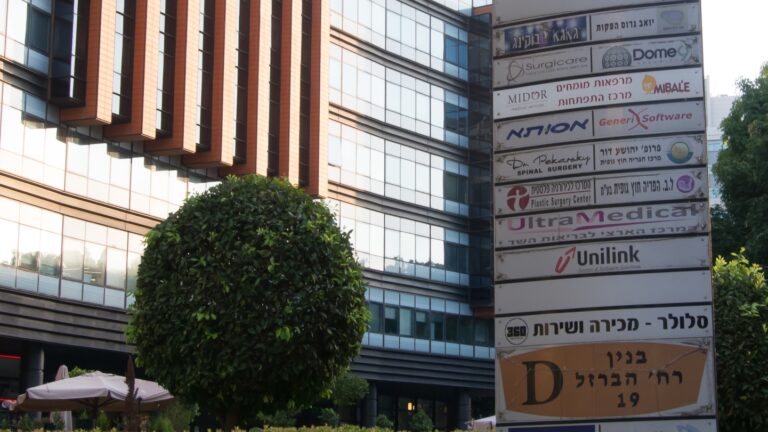
Tel Aviv named startup capital
2012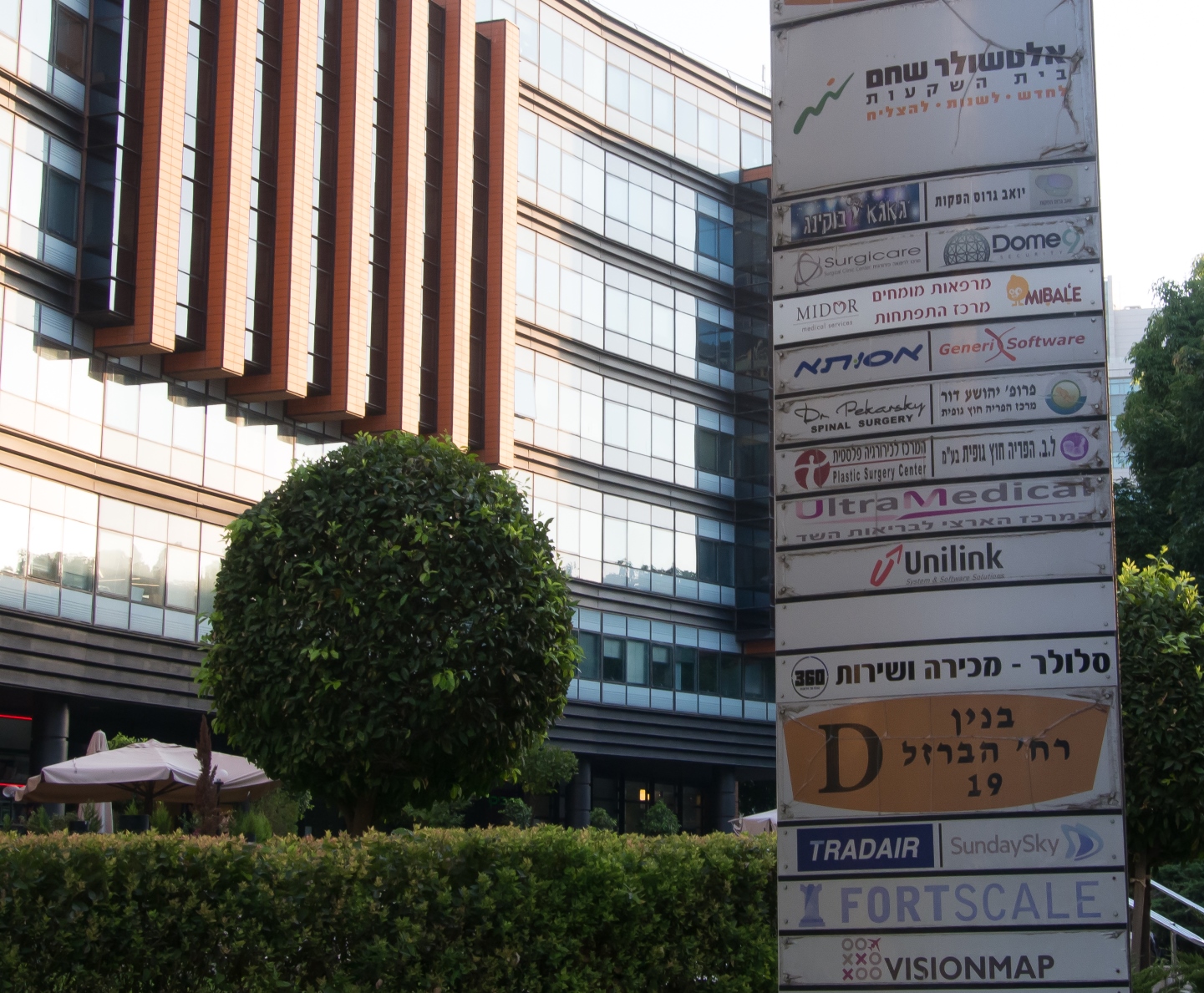
• An international study finds Tel Aviv the best place for high-tech startup companies second only to Silicon Valley. Israel has more companies listed in 2012 on the NASDAQ stock exchange than any country outside the United States, save China.
• Jerusalem startup Agilite introduces the Injured Personnel Carrier, enabling rescuers to carry or evacuate an incapacitated person on their back, hands-free. Weighing less than a pound, the “human backpack” can bear 5,000 pounds and folds down to 10 inches. Agilite later invented the Instant Harness, used in the rescue of South African miners in 2013.
• Israeli ride-sharing app Via is launched. Via has been tapped by cities and transit authorities in a growing number of American, European, Asian, Australian and New Zealand cities to help re-engineer public transit into a dynamic, on-demand network. In 2016, Via raised $100m in funding.
• Jerusalem-based NDS is acquired by Cisco for $5 billion.
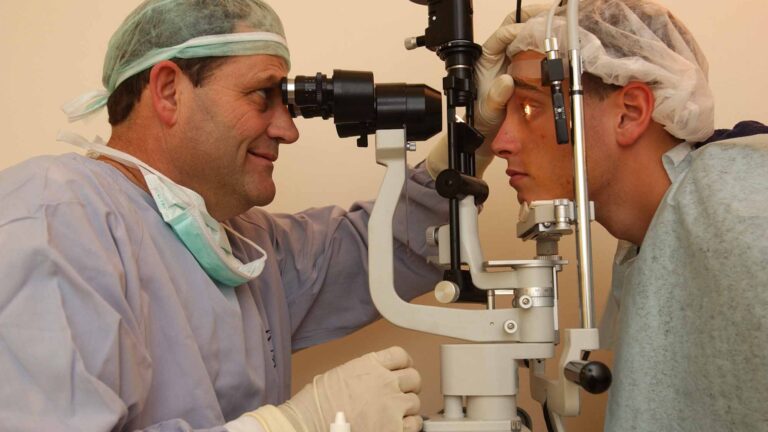
High points in high-tech and blindness prevention
2013• In this record-breaking year for Israeli high-tech, 662 companies closed financing rounds, raising a cumulative $2.3 billion. The life-sciences sector led with $522 million raised. Israeli venture-capital fund investments reached $546 million in 2013.
• The total value of exits by Israeli technology companies in 2013 was $7.6 billion, led by Google’s acquisition of Waze for $1.03 billion.
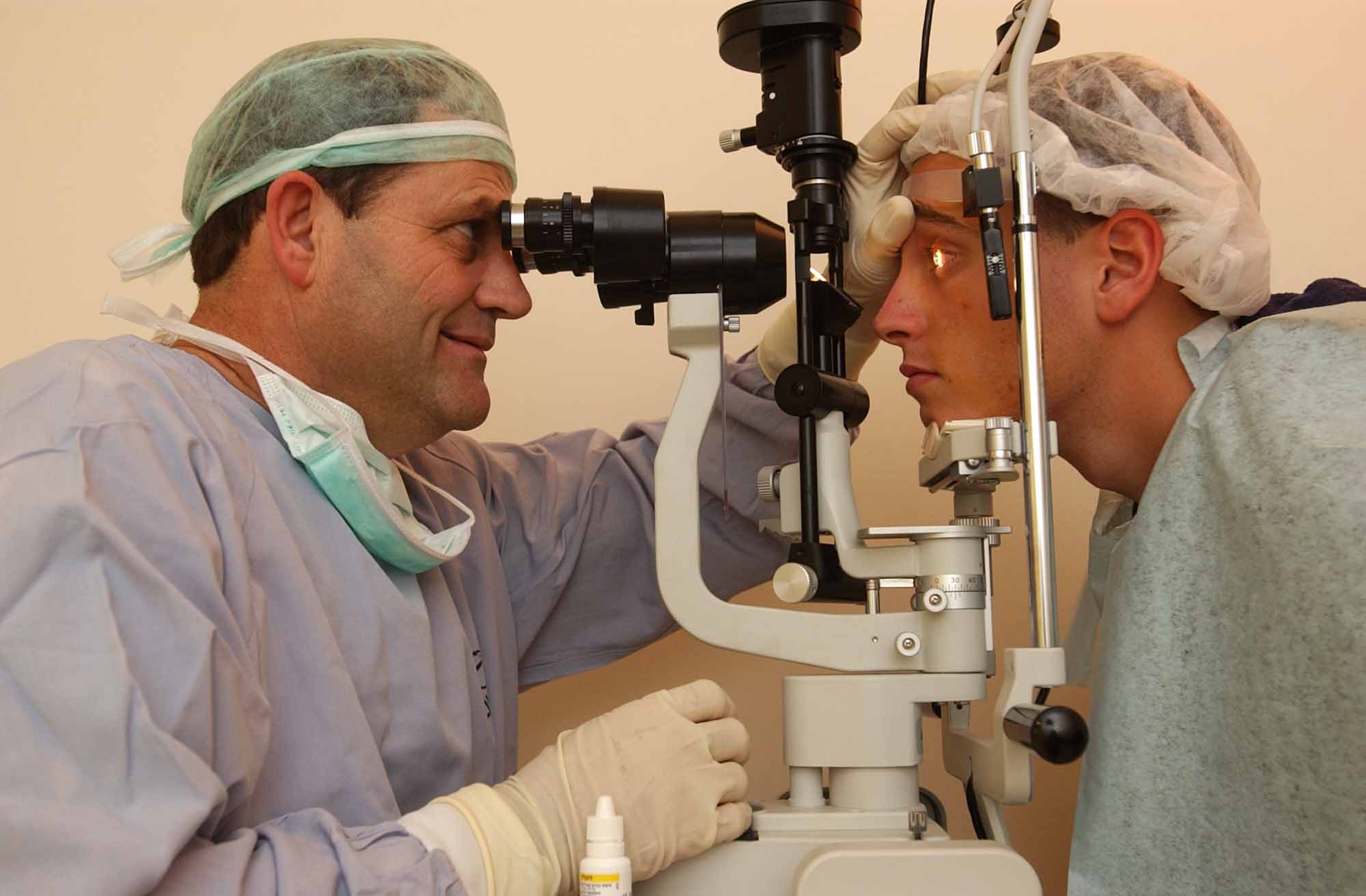
• A study in the American Journal of Ophthalmology shows that Israel leads the world in preventing and treating all four main causes of preventable blindness: age-related deterioration, glaucoma, diabetes and cataracts.
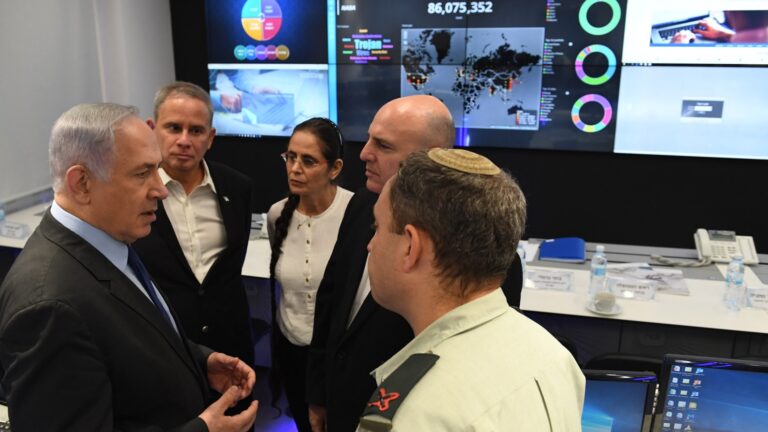
Israel opens national cyber complex, joins CERN
2014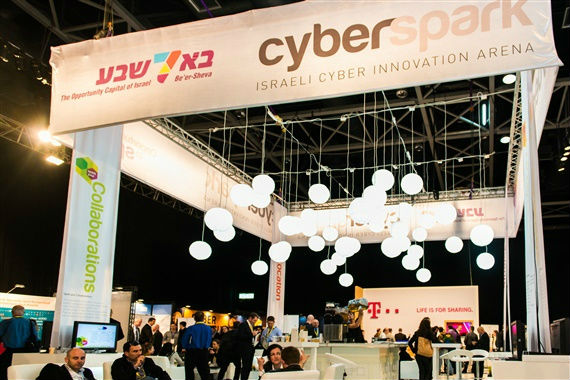
• CyberSpark national cyber complex opens in Beersheva, highlighting Israel’s growing prominence in cyber technologies. In 2014, Israel exports more than $6 billion in cybersecurity products, double the total in 2013. Today, Israel is considered one of the world leaders in cybertechnology.
• Israel becomes the 21st member state of the European Organization for Nuclear Research (CERN). At the ceremony, the Foreign Ministry reveals that Israel has the highest number of scientists, technicians and engineers per capita in the world (140 per 10,000 individuals) and creates more than 1% of the scientific knowledge in the world even though its population is only one thousandth of the world’s population.
Stem-cell technology, a pocket molecular sensor
2015• Israel ranks in the top 20 nations in the world on the UN’s 2015 Human Development Index.
• Kadimastem’s stem-cell technology with the potential to treat neurodegenerative diseases including amyotrophic lateral sclerosis (ALS) goes into development by Prof. Michel Revel, who developed MS drug Rebif.
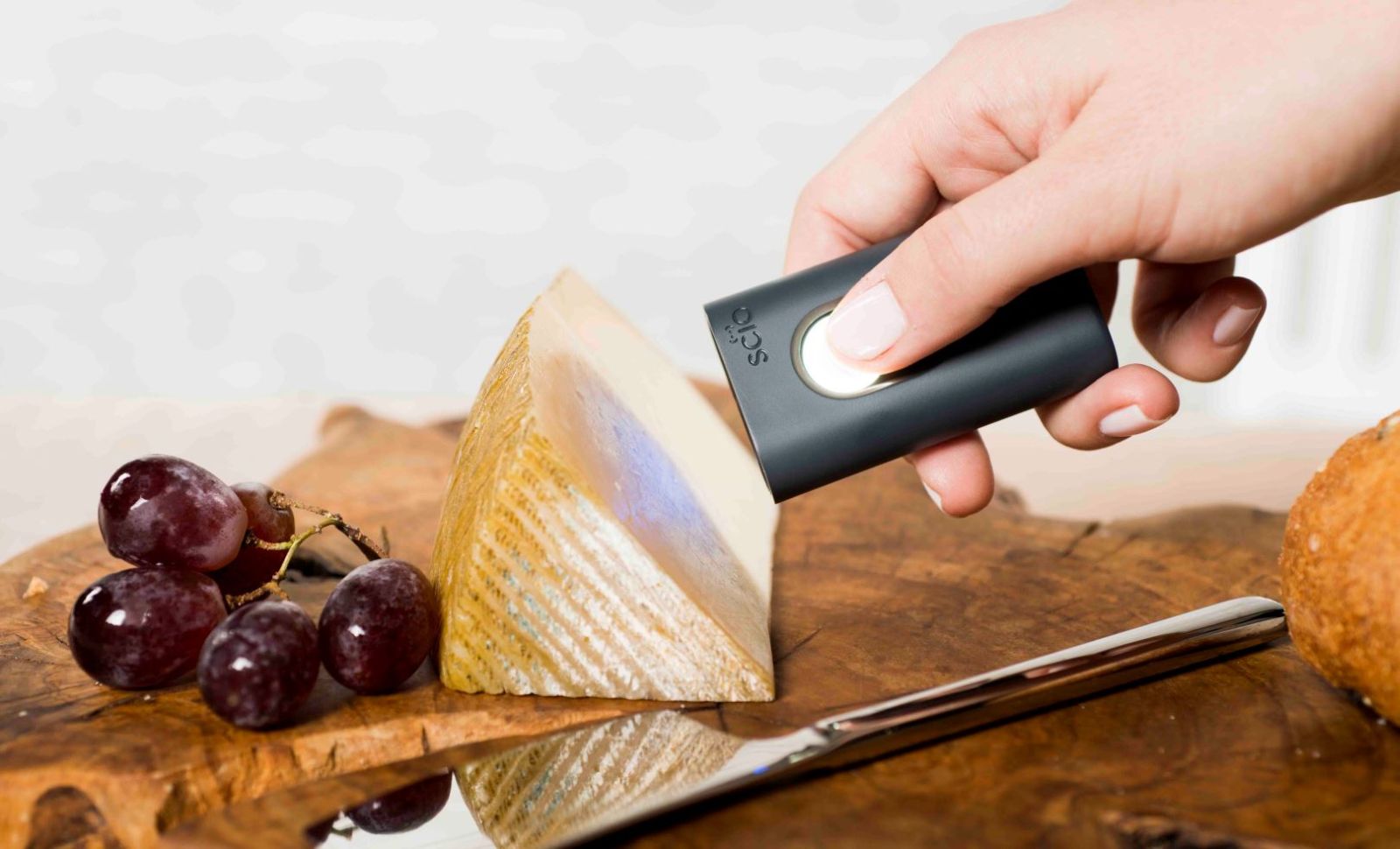
• Consumer Physics introduces the prototype of SCiO, the world’s first consumer-grade molecular sensor. The tiny spectrometer allows you to get instant relevant information about the chemical makeup of foods, plants, medicines, diamonds and more.
IDF field hospital is rated world's best
2016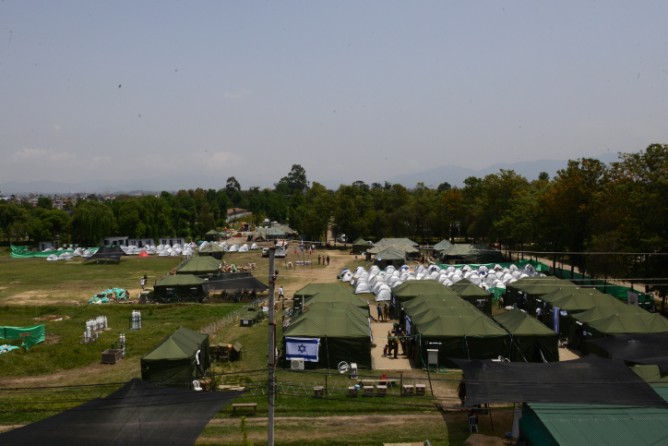
• The IDF Medical Corps field hospital is rated the world’s best by the World Health Organization (WHO), becoming the first field hospital ever to achieve WHO’s Type 3 rating for providing inpatient referral surgical care along with emergency and surgical care.
• Neurology and radiology experts at Rambam Health Care Campus in Haifa use the Exablate Neuro guided magnetic resonance system developed by Insightec to cure a woman’s essential tremor without incisions or anesthesia.
• Investors, researchers and high-tech entrepreneurs from around the world gather in Tel Aviv at CannaTech 2016, the first International Summit for Accelerating Cannabis Innovation.
• Netflix picks up “Fauda” (“Chaos”), the Israeli TV thriller focusing on an undercover counterterrorism unit of the Israeli Defense Forces. The global streaming site labels the show a Netflix Original Series, marking the first time an Israeli series earns this title. The New York Times votes “Fauda” the best international show of 2017.
• Social gaming platform Playtika is acquired by Giant Interactive for $4.4 billion.
Wonder Woman, wondrous medical news and world disaster aid
2017
• Former Miss Israel and IDF combat instructor Gal Gadot stars in “Wonder Woman,” a summer blockbuster that becomes the highest-grossing film directed by a woman, the highest-grossing superhero origin film in the US and worldwide, and the largest opening for a female-led comic book film. Gadot was the highest-grossing actress of the year, amassing $1.4 billion worldwide. Gadot and the movie receive a panoply of accolades from media such as GQ and Rotten Tomatoes.
• Over the course of the summer, Israeli governmental and non-governmental groups send aid and personnel following natural disasters in Texas, Mexico, Haiti, the Caribbean, Florida, Puerto Rico, Nepal and Sierra Leona.
• In a world first, two Israeli patients receive injected lab-grown bone tissue developed by BonusBioGroup.
• Israeli startups raise more than $5 billion, besting 2016’s record of $4.8 billion, according to a year-end report by IVC Research Center.
• The population of Israel reaches 8.793 million.
Israel ranks in top 10 most powerful, innovative nations
2018• U.S. News and World Report ranks Israel the eighth most powerful nation in the world. Bloomberg News names the Jewish state the 10th most innovative worldwide, edging out the United States.
• Israel’s population in 2018 stands at 8.84 million. The average life expectancy in Israel is the fifth highest worldwide, at 80.7 years for men, and 84.2 years for women. In addition, the country comes in 11th in overall happiness.
• In the high tech industry, there are now 8,000 active high-tech companies operating in Israel, according to Israel Venture Capital Research Center. The center also reported there are 1,487 life science companies, 505 cyber security companies, 356 Israel accelerators and incubators, and 365 active foreign R&D centers.
• The first direct proof of the existence of dark matter in the universe is revealed by Tel Aviv University astrophysicist Rennan Barkana based on radio signals emanating from outer space.
• Israeli trauma experts fly to Houston to train educators and counselors in resilience following Hurricane Harvey and to Florida after a mass school shooting in Parkland. The Israel Trauma Coalition also is leading trainings in Mexico and in Las Vegas for communities affected by an earthquake and a mass shooting, respectively, in late 2017.
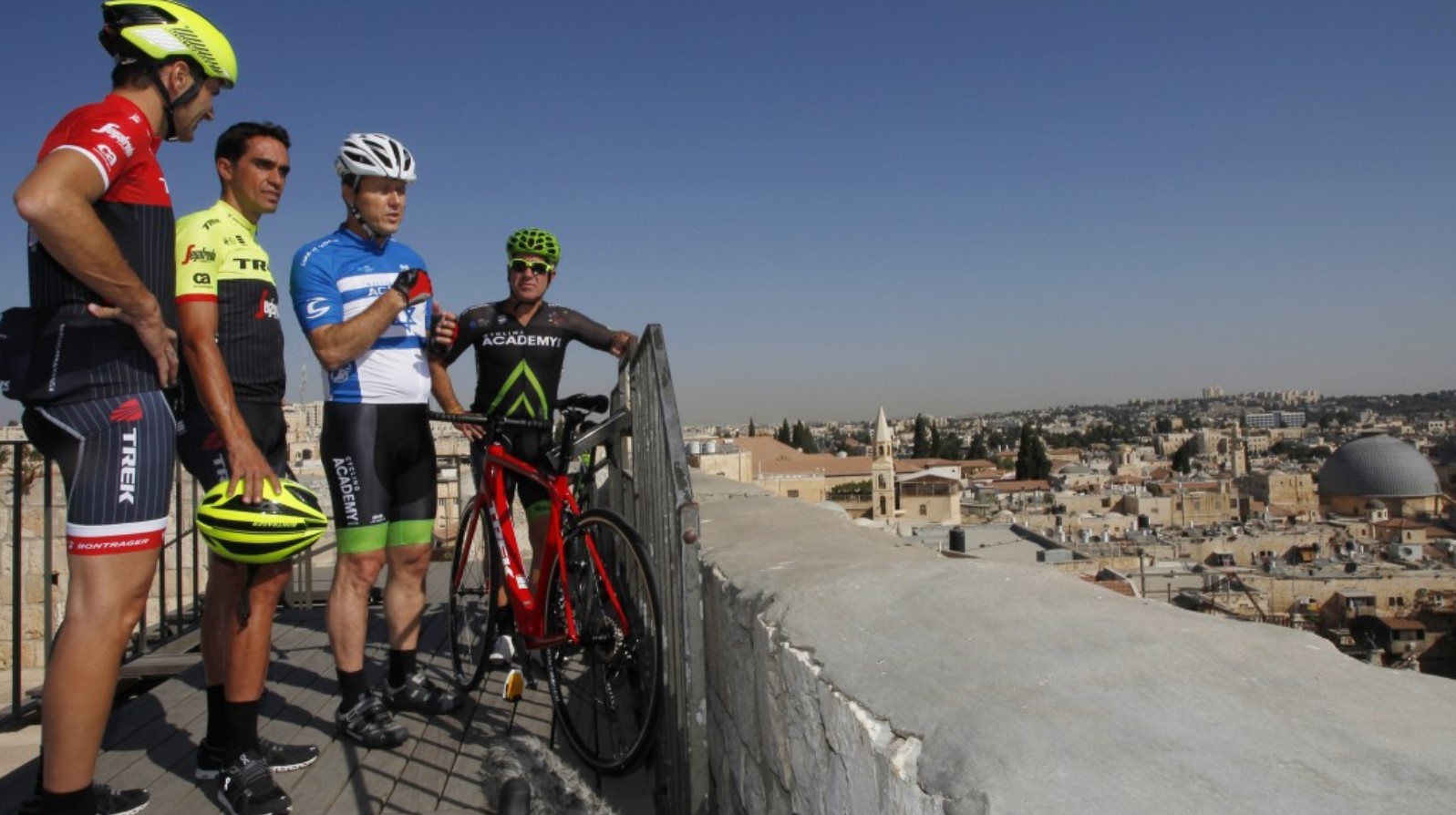
• Israel hosts the Big Start tour preceding the Giro D’Italia cycling race, marking the first time a Grand Tour is taking place outside of Europe.
• Israeli electronics firm Orbotech is acquired for $3.4 billion.
70 years of Israeli milestones in 165 seconds
2018Join us on a journey through the last 70 years to discover how Israel has become one of the most creative and innovative countries in the world.
2019 was a record-breaking year for Israel's economy
2019
• From tourism to tech, exports to the illusive “unicorn,” Israeli businesses scored higher in many economic categories in 2019 than ever before. Two outstanding examples: Intel’s $2 billion buyout of Habana Labs and Medtronic’s acquisition of Mazor Robotics for $1.64 billion.
• Eurovision fans voted “Dare to Dream,” the Eurovision Song Contest held May 14-18 in Tel Aviv, the best Eurovision production of the decade. Israel had won the privilege of hosting the 2019 Eurovision by virtue of Netta Barzilai winning the 2018 contest in Lisbon.
• In 2019, Israel marked many medical firsts: Tel Aviv University scientists created the world’s first 3D-printed heart with blood vessels; two Israeli patients received the world’s first artificial meniscus; Hadassah University Medical Center surgeons performed the first-ever live vein transplant; and neurosurgeons in the US used a virtual-reality tool developed by former Israeli fighter pilots to rehearse an unprecedented procedure on a child.
• On April 11, the SpaceIL unmanned spacecraft Beresheet made history when it reached the moon, only to crash upon arrival. In true Israeli spirit, a disappointing end to a spectacular mission was framed as a temporary setback on a sure trajectory to success.
Israel confronts coronavirus with innovation and chutzpah
2020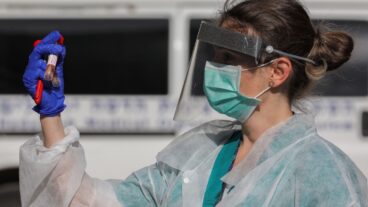
• The novel coronavirus pandemic will forever define 2020. Israel has responded to the crisis with typical ingenuity, quickly applying many existing technologies and inventing new ones for better prevention, diagnosis, monitoring and treatment of Covid-19 patients.
• January 15 marked a historic day for Israel and Egypt, as Israel began exporting liquified natural gas to its former enemy nation. The gas comes mainly from Leviathan, one of two major natural gas fields discovered in Israel over the past decade.
• Israeli start-up Beewise introduced Beehome, the world’s first autonomous beehive, that can house up to 2 million bees and take care of their health and upkeep through a simple app on the beekeeper’s phone or tablet.
• In a sign of warming ties between Israel and the United Arab Emirates, Israel’s professional cycling team competed in the UAE Tour in February, becoming the first Israeli team to participate in the Middle East’s top cycling race.
Fighting for Israel's truth
We cover what makes life in Israel so special — it's people. A non-profit organization, ISRAEL21c's team of journalists are committed to telling stories that humanize Israelis and show their positive impact on our world. You can bring these stories to life by making a donation of $6/month.





